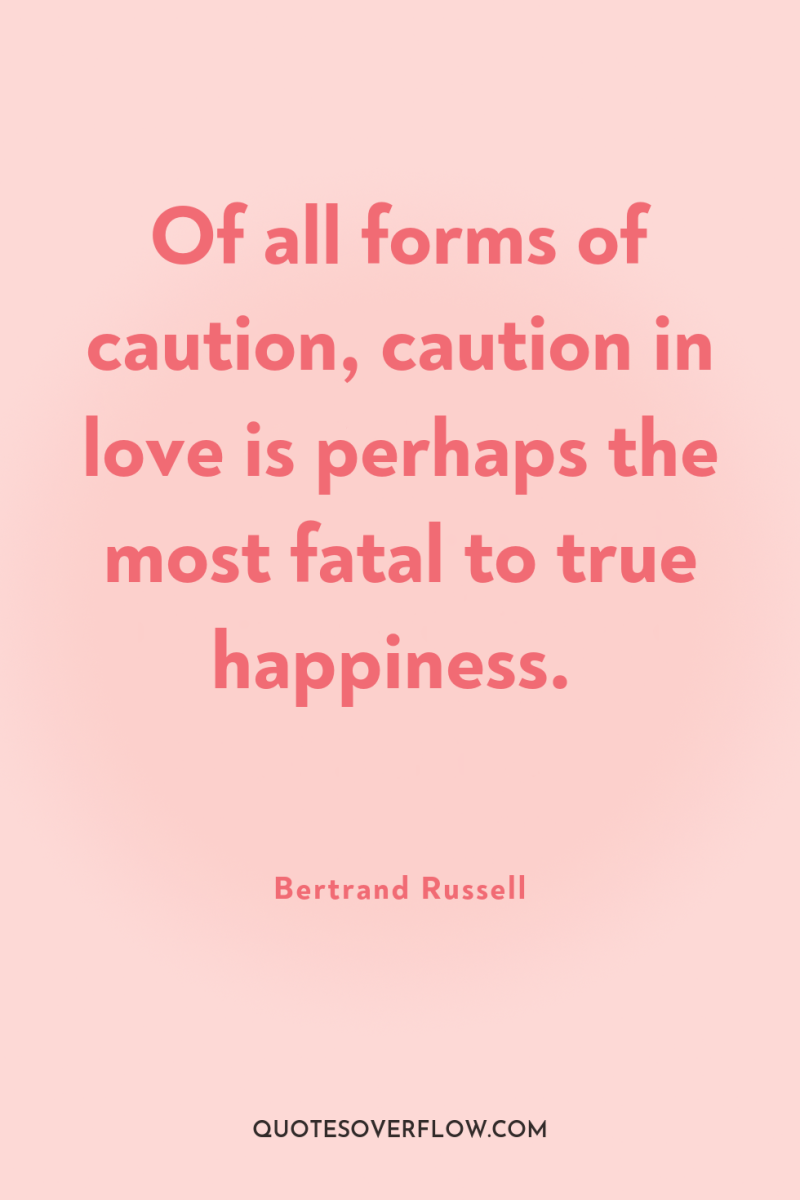
1
Of all forms of caution, caution in love is perhaps the most fatal to true happiness.Bertrand Russell

2
To fear love is to fear life, and those who fear life are already 3-parts dead.Bertrand Russell
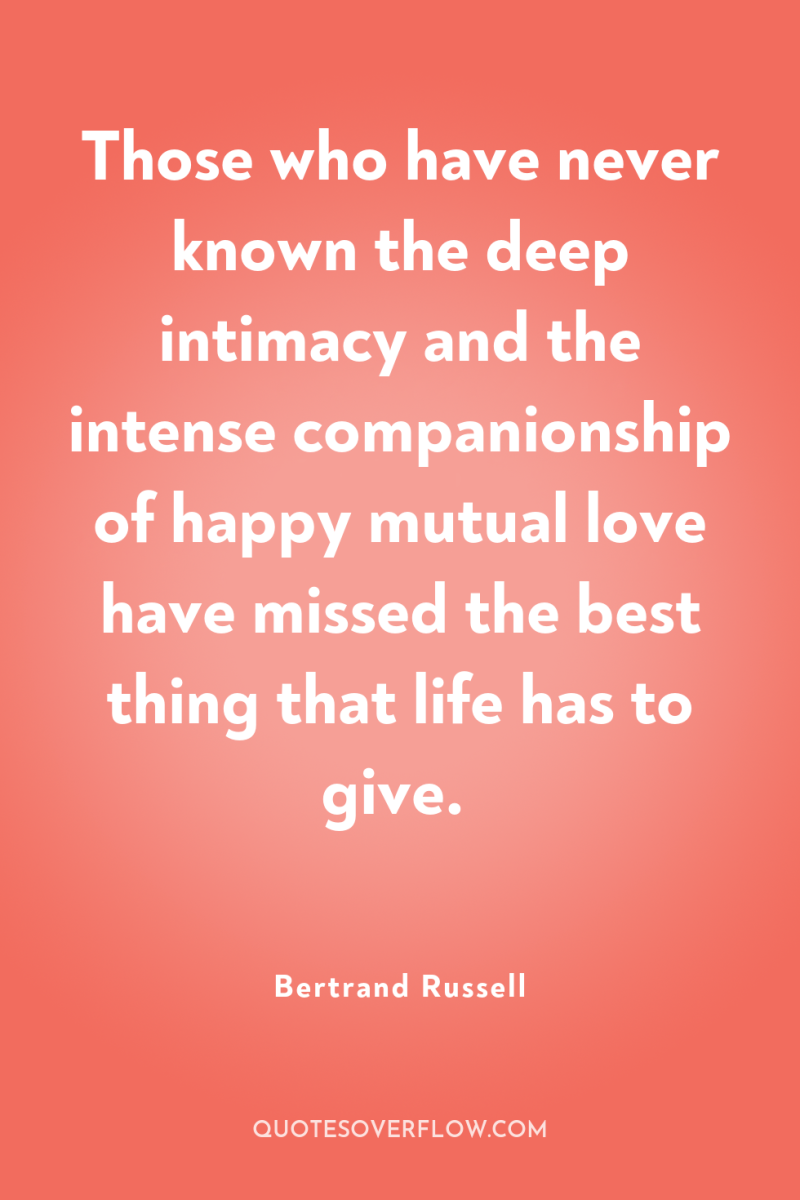
3
Those who have never known the deep intimacy and the intense companionship of happy mutual love have missed the best thing that life has to give.Bertrand Russell
4
Three passions, simple but overwhelmingly strong, have governed my life: the longing for love, the search for knowledge, and unbearable pity for the suffering of mankind. These passions, like great winds, have blown me hither and thither, in a wayward course, over a great ocean of anguish, reaching to the very verge of despair. I have sought love, first, because it brings ecstasy - ecstasy so great that I would often have sacrificed all the rest of life for a few hours of this joy. I have sought it, next, because it relieves loneliness--that terrible loneliness in which one shivering consciousness looks over the rim of the world into the cold unfathomable lifeless abyss. I have sought it finally, because in the union of love I have seen, in a mystic miniature, the prefiguring vision of the heaven that saints and poets have imagined. This is what I sought, and though it might seem too good for human life, this is what--at last-- I have found. With equal passion I have sought knowledge. I have wished to understand the hearts of men. I have wished to know why the stars shine. And I have tried to apprehend the Pythagorean power by which number holds sway above the flux. A little of this, but not much, I have achieved. Love and knowledge, so far as they were possible, led upward toward the heavens. But always pity brought me back to earth. Echoes of cries of pain reverberate in my heart. Children in famine, victims tortured by oppressors, helpless old people a burden to their sons, and the whole world of loneliness, poverty, and pain make a mockery of what human life should be. I long to alleviate this evil, but I cannot, and I too suffer. This has been my life. I have found it worth living, and would gladly live it again if the chance were offered me.Bertrand Russell
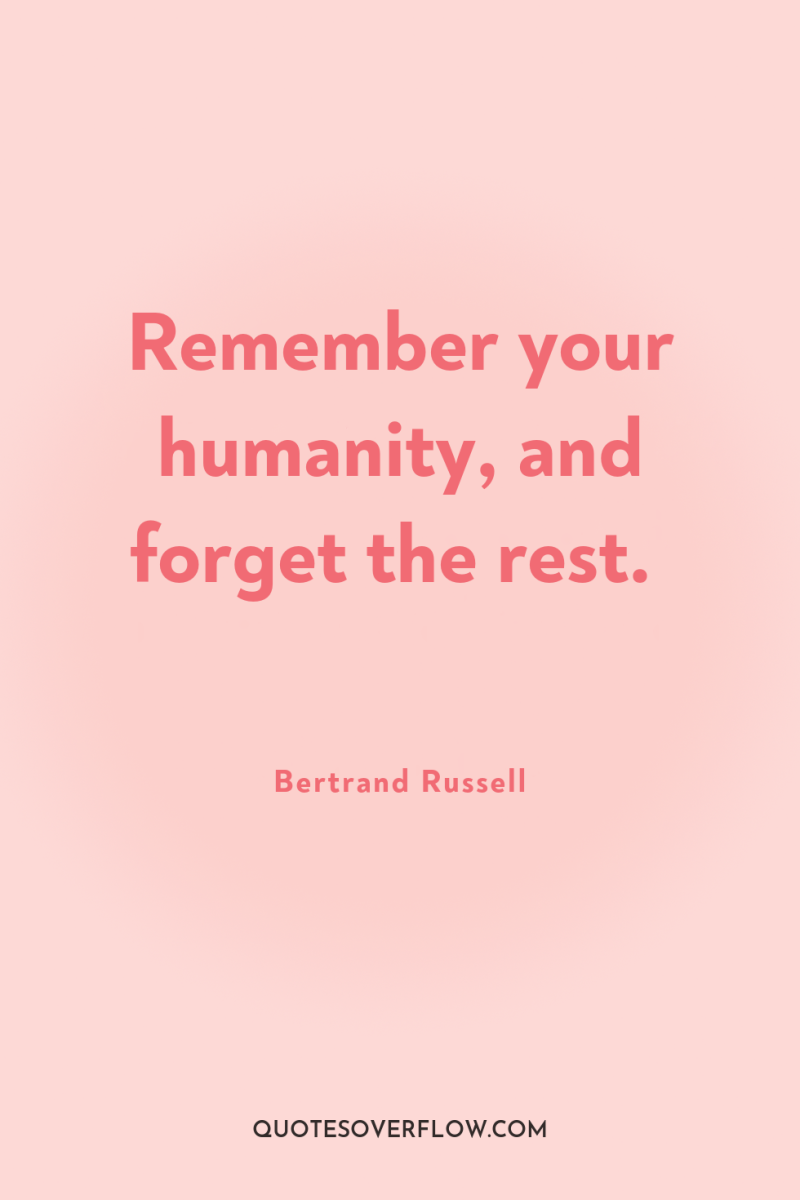
5
Remember your humanity, and forget the rest.Bertrand Russell

6
There are two motives for reading a book; one, that you enjoy it; the other, that you can boast about it.Bertrand Russell

7
Do not fear to be eccentric in opinion, for every opinion now accepted was once eccentric.Bertrand Russell

8
I would never die for my beliefs because I might be wrong.Bertrand Russell
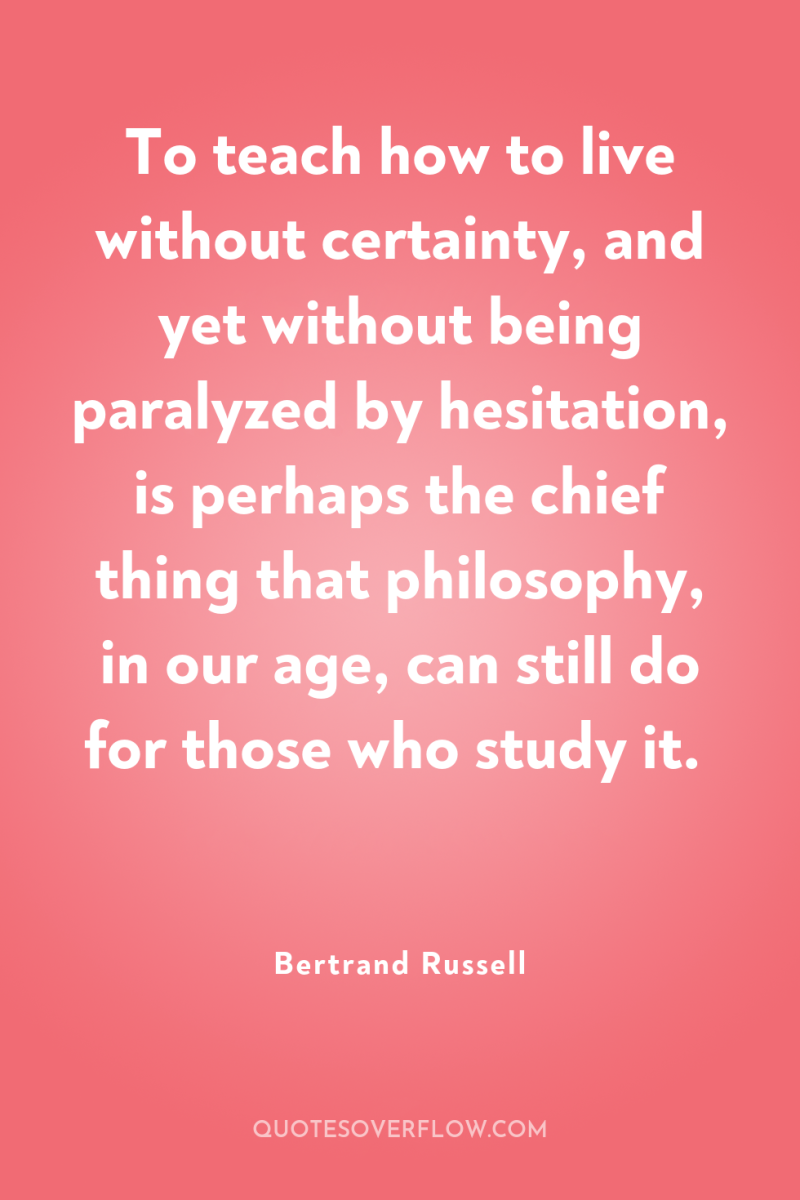
9
To teach how to live without certainty, and yet without being paralyzed by hesitation, is perhaps the chief thing that philosophy, in our age, can still do for those who study it.Bertrand Russell
10
As a philosopher, if I were speaking to a purely philosophic audience I should say that I ought to describe myself as an Agnostic, because I do not think that there is a conclusive argument by which one can prove that there is not a God. On the other hand, if I am to convey the right impression to the ordinary man in the street I think that I ought to say that I am an Atheist, because, when I say that I cannot prove that there is not a God, I ought to add equally that I cannot prove that there are not the Homeric gods.Bertrand Russell
11
My desire and wish is that the things I start with should be so obvious that you wonder why I spend my time stating them. This is what I aim at because the point of philosophy is to start with something so simple as not to seem worth stating, and to end with something so paradoxical that no one will believe it.Bertrand Russell
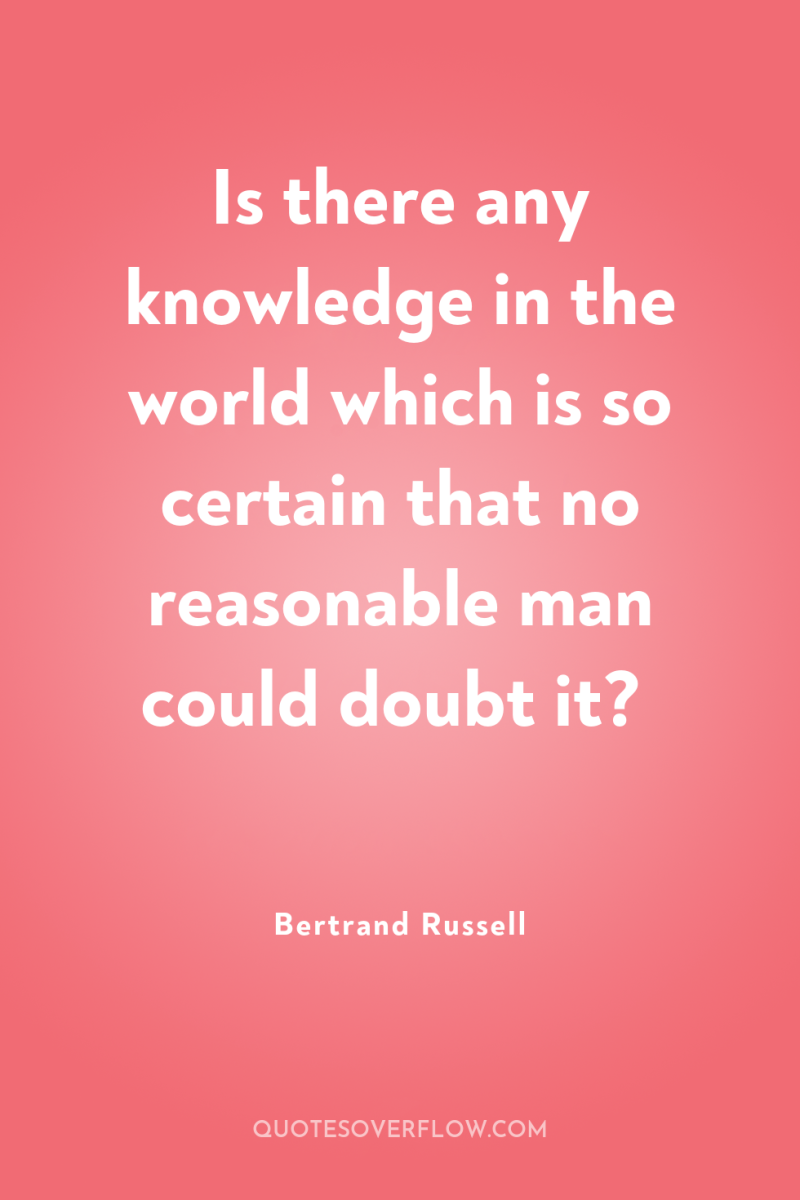
12
Is there any knowledge in the world which is so certain that no reasonable man could doubt it?Bertrand Russell
13
Anything you're good at contributes to happiness.Bertrand Russell
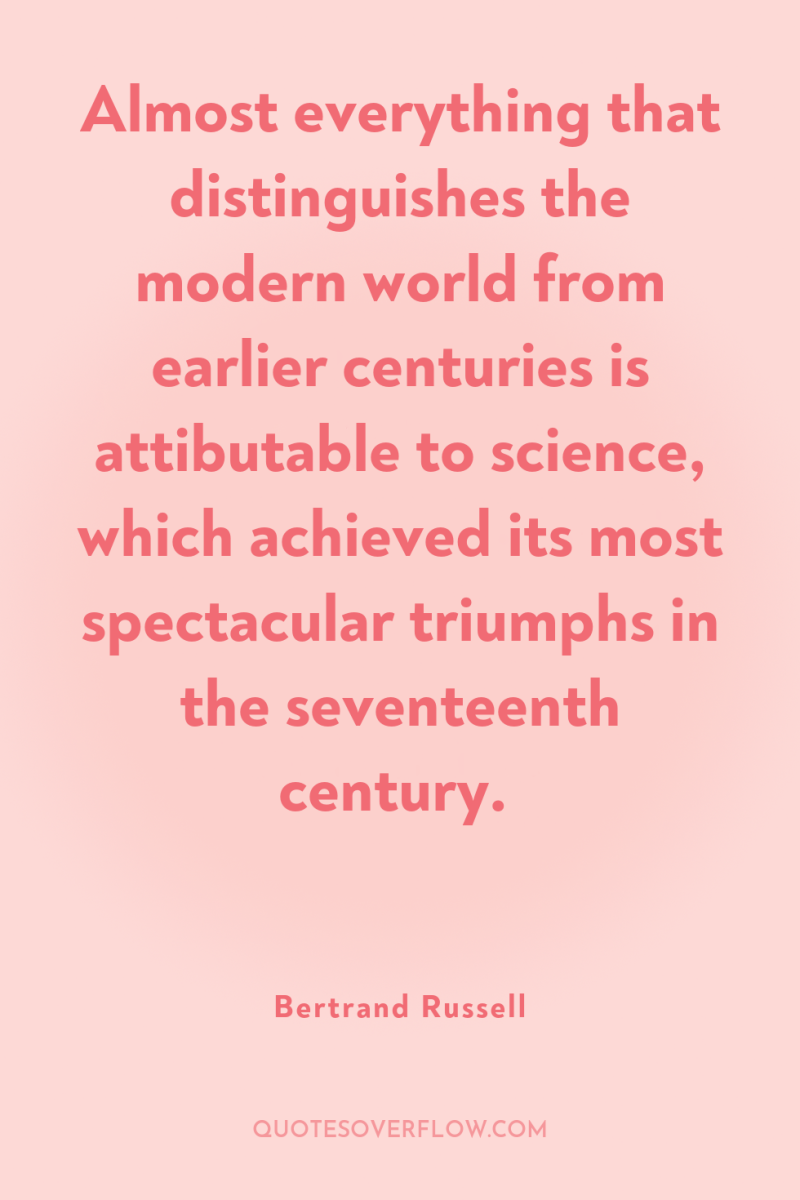
14
Almost everything that distinguishes the modern world from earlier centuries is attibutable to science, which achieved its most spectacular triumphs in the seventeenth century.Bertrand Russell
15
Philosophy, though unable to tell us with certainty what is the true answer to the doubts which it raises, is able to suggest many possiblities which enlarge our thoughts and free them from the tyranny of custom. Thus, while diminishing our feeling of certainty as to what things are, it greatly increases our knowledge as to what the may be; it removes the somewhat arrogant dogmatism of those who have never travelled into the region of liberating doubt, and it keeps alive our sense of wonder by showing familar things in an unfamilar aspect .Bertrand Russell
16
When you come to look into this argument from design, it is a most astonishing thing that people can believe that this world, with all the things that are in it, with all its defects, should be the best that omnipotence and omniscience have been able to produce in millions of years. I really cannot believe it. Do you think that, if you were granted omnipotence and omniscience and millions of years in which to perfect your world, you could produce nothing better than the Ku Klux Klan or the Fascists? Moreover, if you accept the ordinary laws of science, you have to suppose that human life and life in general on this planet will die out in due course: it is a stage in the decay of the solar system; at a certain stage of decay you get the sort of conditions of temperature and so forth which are suitable to protoplasm, and there is life for a short time in the life of the whole solar system. You see in the moon the sort of thing to which the earth is tending -- something dead, cold, and lifeless. .Bertrand Russell
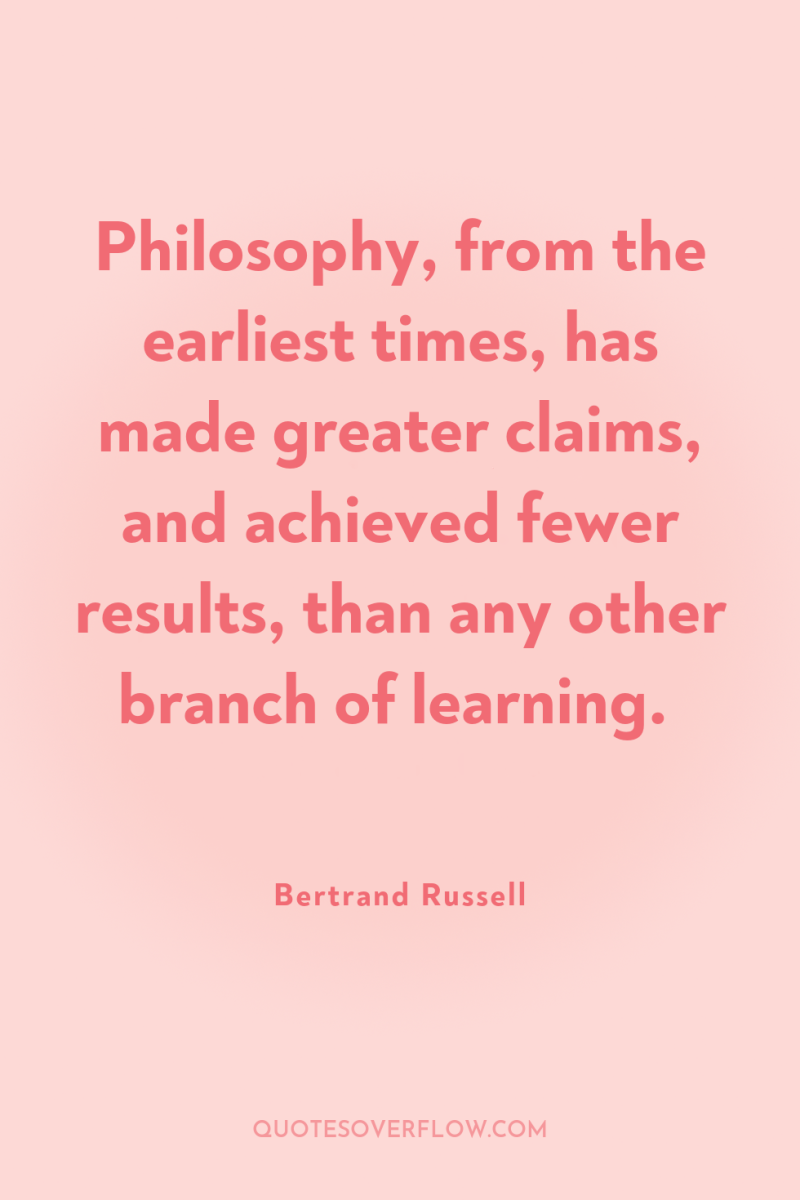
17
Philosophy, from the earliest times, has made greater claims, and achieved fewer results, than any other branch of learning.Bertrand Russell
18
If the ordinary wage-earner worked four hours a day, there would be enough for everybody and no unemployment -- assuming a certain very moderate amount of sensible organization. This idea shocks the well-to-do, because they are convinced that the poor would not know how to use so much leisure. In America men often work long hours even when they are well off; such men, naturally, are indignant at the idea of leisure for wage-earners, except as the grim punishment of unemployment; in fact, they dislike leisure even for their sons.Bertrand Russell
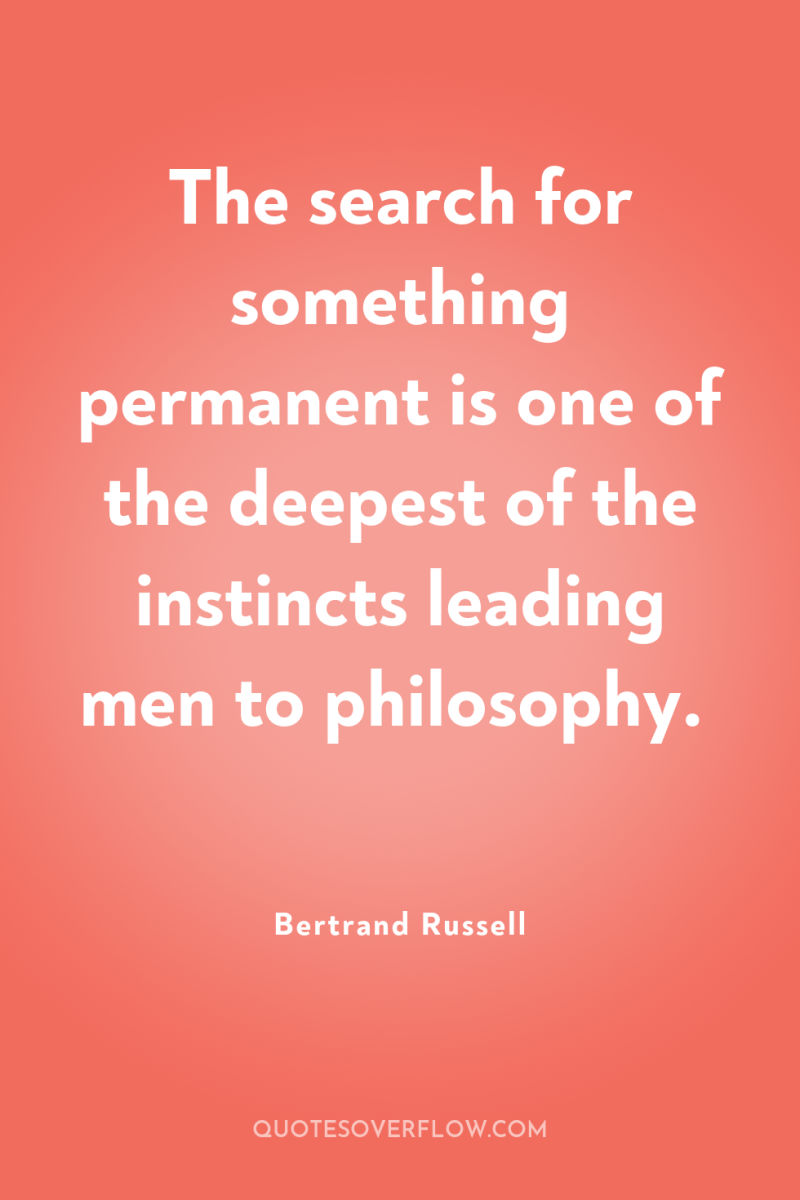
19
The search for something permanent is one of the deepest of the instincts leading men to philosophy.Bertrand Russell
20
There lies before us, if we choose, continual progress in happiness, knowledge and wisdom. Shall we instead choose death, because we cannot forget our quarrels? I appeal as a human being to human beings; remember your humanity, and forget the rest.Bertrand Russell
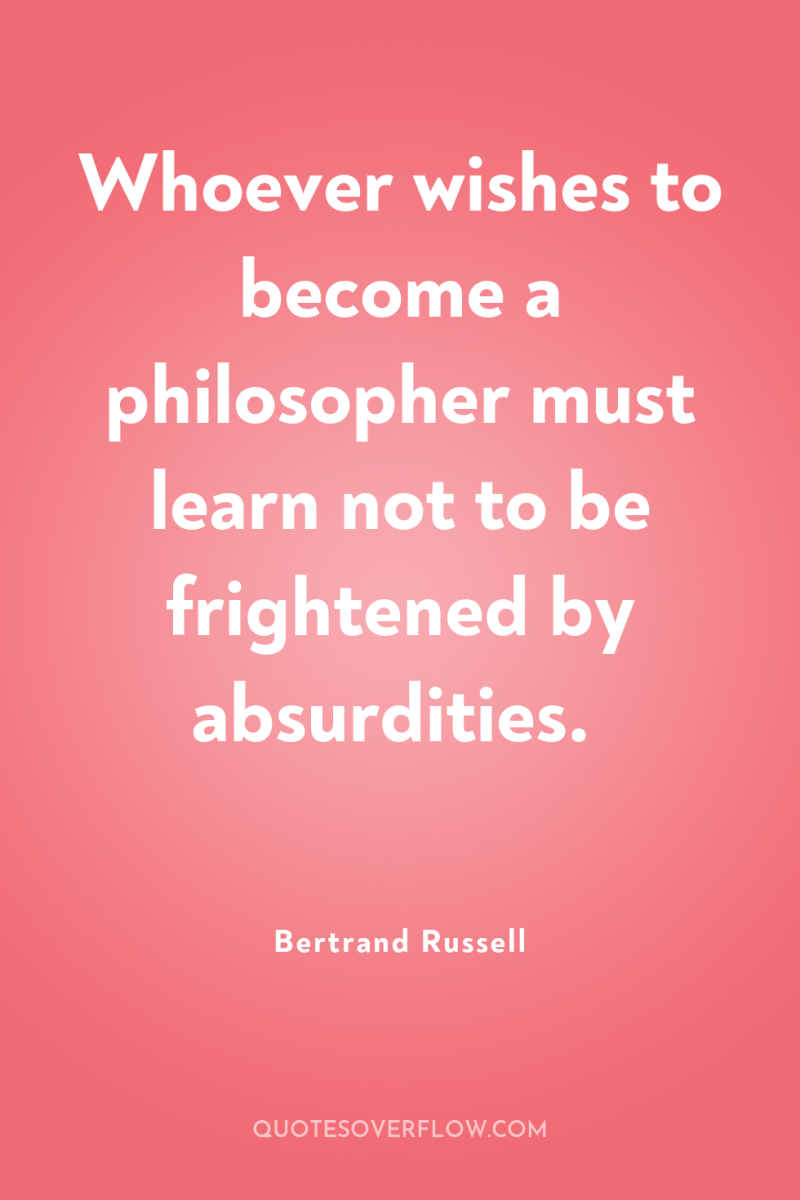
21
Whoever wishes to become a philosopher must learn not to be frightened by absurdities.Bertrand Russell
22
How, in such an alien and inhuman world, can so powerless a creature as man preserve his aspirations untarnished? A strange mystery it is that nature, omnipotent but blind, in the revolutions of her secular hurryings through the abysses of space, has brought forth at last a child, subject still to her power, but gifted with sight, with knowledge of good and evil, with the capacity of judging all the works of his unthinking mother. In spite of death, the mark and seal of the parental control, man is yet free, during his brief years, to examine, to criticize, to know, and in imagination to create. To him alone, in the world with which he is aquainted, this freedom belongs; and in this lies his superiority to the resistless forces that control his outward life.Bertrand Russell
23
The man who has no tincture of philosophy goes through life imprisoned in the prejudices derived from common sense, from the habitual beliefs of his age or his nation, and from convictions which have grown up in his mind without the cooperation or consent of his deliberate reason.Bertrand Russell
24
I have been accused of a habit of changing my opinions. I am not myself in any degree ashamed of having changed my opinions. What physicist who was already active in 1900 would dream of boasting that his opinions had not changed during the last half century? In science men change their opinions when new knowledge becomes available; but philosophy in the minds of many is assimilated rather to theology than to science. The kind of philosophy that I value and have endeavoured to pursue is scientific, in the sense that there is some definite knowledge to be obtained and that new discoveries can make the admission of former error inevitable to any candid mind. For what I have said, whether early or late, I do not claim the kind of truth which theologians claim for their creeds. I claim only, at best, that the opinion expressed was a sensible one to hold at the time when it was expressed. I should be much surprised if subsequent research did not show that it needed to be modified. I hope, therefore, that whoever uses this dictionary will not suppose the remarks which it quotes to be intended as pontifical pronouncements, but only as the best I could do at the time towards the promotion of clear and accurate thinking. Clarity, above all, has been my aim.Bertrand Russell
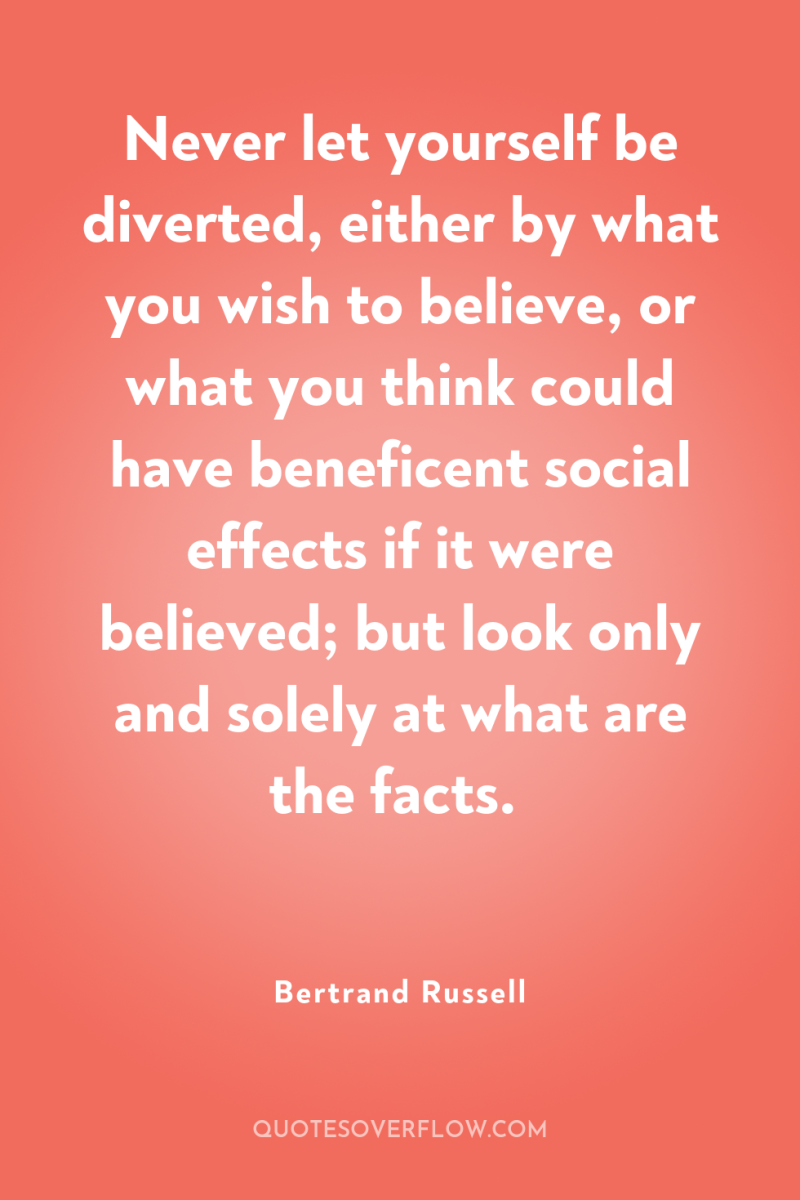
25
Never let yourself be diverted, either by what you wish to believe, or what you think could have beneficent social effects if it were believed; but look only and solely at what are the facts.Bertrand Russell

26
It is possible that mankind is on the threshold of a golden age; but, if so, it will be necessary first to slay the dragon that guards the door, and this dragon is religion.Bertrand Russell

27
Grammar and ordinary language are bad guides to metaphysics. A great book might be written showing the influence of syntax on philosophy.Bertrand Russell
28
William James describes a man who got the experience from laughing-gas; whenever he was under its influence, he knew the secret of the universe, but when he came to, he had forgotten it. At last, with immense effort, he wrote down the secret before the vision had faded. When completely recovered, he rushed to see what he had written. It was: "A smell of petroleum prevails throughout.Bertrand Russell
29
СледуеÑ‚ признаÑ‚ь, чÑ‚о имееÑ‚ÑÑ Ð¾Ð¿Ñ€ÐµÐ´ÐµÐ»ÐµÐ½Ð½Ñ‹й Ñ‚ип хриÑÑ‚ианÑкой ÑÑ‚ики, к коÑ‚орому оÑуждаюÑâ€°Ð°Ñ ÐºÑ€Ð¸Ñ‚ика Ðицше можеÑ‚ бÑ‹Ñ‚ь применена Ñправедливо. ПаÑкаль и ДоÑÑ‚оевÑкий, коÑ‚орÑ‹х он Ñам приводиÑ‚ в качеÑÑ‚ве примера, — оба имеюÑ‚ чÑ‚о-Ñ‚о жалкое в Ñвоей добродеÑ‚ели. ПаÑкаль Ð¿Ñ€Ð¸Ð½ÐµÑ Ð² жерÑ‚ву Ñвоему Богу великолепнÑ‹й маÑ‚емаÑ‚ичеÑкий ум, Ñ‚ем ÑамÑ‹м припиÑÑâ€¹Ð²Ð°Ñ Ð‘Ð¾Ð³Ñƒ жеÑÑ‚окоÑÑ‚ь, коÑâ€šÐ¾Ñ€Ð°Ñ ÑвлÑеÑ‚ÑÑ ÐºÐ¾ÑмичеÑким раÑширением болезненнÑ‹х душевнÑ‹х мук Ñамого ПаÑкалÑ. ДоÑÑ‚оевÑкий не желал имеÑ‚ь ничего общего Ñ Â«Ð»Ð¸Ñ‡Ð½Ð¾Ð¹ гордоÑÑ‚ью»; он Ñогрешил бÑ‹, чÑ‚обÑ‹ покаÑÑ‚ьÑÑ Ð¸ иÑпÑ‹Ñ‚аÑ‚ь наÑлаждение иÑповеди. Я не ÑÑ‚ану обÑуждаÑ‚ь вопроÑ, наÑколько в Ñ‚аких помрачениÑÑ… ума ÑледуеÑ‚ обвинÑÑ‚ь хриÑÑ‚ианÑÑ‚во, но Ñ ÑоглаÑен Ñ Ðицше, ÑчиÑâ€šÐ°Ñ Ð¿Ñ€Ð¾ÑÑ‚рацию ДоÑÑ‚оевÑкого презренной. Я должен ÑоглаÑиÑ‚ьÑÑ Ð¸ Ñ Ñ‚ем, чÑ‚о прÑмоÑ‚а и гордоÑÑ‚ь и даже некоÑ‚орое ÑамоуÑ‚верждение ÑвлÑÑŽÑ‚ÑÑ ÑлеменÑ‚ами Ñамого лучшего харакÑ‚ера. ÐÐµÐ»ÑŒÐ·Ñ Ð²Ð¾ÑхищаÑ‚ьÑÑ Ð´Ð¾Ð±Ñ€Ð¾Ð´ÐµÑ‚елью, в оÑнове коÑ‚орой лежиÑ‚ ÑÑ‚рах. .Bertrand Russell
30
Со Ñвоей ÑÑ‚оронÑ‹, Ñ Ð¿Ñ€ÐµÐ´Ð¿Ð¾Ñ‡Ð¸Ñ‚аю онÑ‚ологичеÑкое доказаÑ‚ельÑÑ‚во [ÑущеÑÑâ€šÐ²Ð¾Ð²Ð°Ð½Ð¸Ñ Ð‘Ð¾Ð³Ð°], коÑмологичеÑкое доказаÑ‚ельÑÑ‚во и оÑÑ‚альной ÑÑ‚арÑ‹й Ð·Ð°Ð¿Ð°Ñ Ð°Ñ€Ð³ÑƒÐ¼ÐµÐ½Ñ‚ов Ñ‚ой ÑенÑ‚именÑ‚альной нелогичноÑÑ‚и, коÑâ€šÐ¾Ñ€Ð°Ñ Ð±ÐµÑ€ÐµÑ‚ начало оÑ‚ РуÑÑо. СÑ‚арÑ‹е доказаÑ‚ельÑÑ‚ва бÑ‹ли по крайней мере чеÑÑ‚нÑ‹ми; еÑли они правильнÑ‹е, Ñ‚о они доказÑ‹вали Ñвою Ñ‚очку зрениÑ, еÑли они неправильнÑ‹е, Ñ‚о Ð´Ð»Ñ Ð»ÑŽÐ±Ð¾Ð¹ криÑ‚ики доÑÑ‚упно доказаÑ‚ь ÑÑ‚о. Ðо Ð½Ð¾Ð²Ð°Ñ Ñâ€šÐµÐ¾Ð»Ð¾Ð³Ð¸Ñ Ñердца оÑ‚казÑ‹ваеÑ‚ÑÑ Ð¾Ñ‚ доказаÑ‚ельÑÑ‚ва; она не можеÑ‚ бÑ‹Ñ‚ь оÑ‚вергнуÑ‚а, поÑ‚ому чÑ‚о она не преÑ‚ендуеÑ‚ на доказаÑ‚ельÑÑ‚во Ñвоей Ñ‚очки зрениÑ. Ð’ конечном ÑчеÑ‚е единÑÑ‚веннÑ‹м оÑнованием Ð´Ð»Ñ ÐµÐµ принÑÑâ€šÐ¸Ñ Ð¾ÐºÐ°Ð·Ñ‹ваеÑ‚ÑÑ Ñ‚о, чÑ‚о она позволÑеÑ‚ нам предаваÑ‚ьÑÑ Ð¿Ñ€Ð¸ÑÑ‚нÑ‹м грезам. ÐÑ‚о не заÑлуживаюÑâ€°Ð°Ñ ÑƒÐ²Ð°Ð¶ÐµÐ½Ð¸Ñ Ð¿Ñ€Ð¸Ñ‡Ð¸Ð½Ð°, и, еÑли бÑ‹ Ñ Ð²Ñ‹бирал между Фомой ÐквинÑким и РуÑÑо, Ñ Ð²Ñ‹брал бÑ‹ Фому ÐквинÑкого.Bertrand Russell
31
Движение романÑ‚изма, в ÑущноÑÑ‚и, ÑÑ‚авило целью оÑвобождение человечеÑкой личноÑÑ‚и оÑ‚ пуÑ‚ общеÑÑ‚веннÑ‹х уÑловноÑÑ‚ей и общеÑÑ‚венной морали. Ð’ чаÑÑ‚ноÑÑ‚и, ÑÑ‚и пуÑ‚Ñ‹ бÑ‹ли лишь беÑполезнÑ‹м препÑÑ‚ÑÑ‚вием к желаÑ‚ельнÑ‹м формам деÑÑ‚ельноÑÑ‚и, Ñ‚ак как ÐºÐ°Ð¶Ð´Ð°Ñ Ð´Ñ€ÐµÐ²Ð½ÑÑ Ð¾Ð±Ñ‰ина вÑ‹рабоÑ‚ала правила поведениÑ, оÑ‚ноÑиÑ‚ельно коÑ‚орÑ‹х нечего ÑказаÑ‚ь, кроме Ñ‚ого, чÑ‚о они Ñ‚радиционнÑ‹. Ðо ÑгоиÑÑ‚ичеÑкие ÑÑ‚раÑÑ‚и, однаждÑ‹ оÑвобожденнÑ‹е, нелегко Ñнова подчиниÑ‚ь инÑ‚ереÑам общеÑÑ‚ва. ХриÑÑ‚ианÑÑ‚во имело определеннÑ‹й уÑпех в уÑмирении «Я». Ðо ÑкономичеÑкие, полиÑ‚ичеÑкие и инÑ‚еллекÑ‚уальнÑ‹е причинÑ‹ ÑÑ‚имулировали мÑÑ‚еж проÑ‚ив церкви, а движение романÑ‚изма перенеÑло мÑÑ‚еж в Ñферу морали. ПооÑâ€°Ñ€ÐµÐ½Ð¸Ñ Ð½Ð¾Ð²Ð¾Ð³Ð¾, ничем не ограниченного «Я» ÑÑно делали общеÑÑ‚венную кооперацию невозможной и поÑÑ‚авили его поÑледоваÑ‚елей перед альÑ‚ернаÑ‚ивой анархии или деÑпоÑ‚изма. Ðгоизм поначалу заÑÑ‚авлÑл людей ожидаÑ‚ь оÑ‚ других оÑ‚ечеÑкой нежноÑÑ‚и. Ðо, когда они оÑ‚крÑ‹ли Ñ Ð½ÐµÐ³Ð¾Ð´Ð¾Ð²Ð°Ð½Ð¸ÐµÐ¼, чÑ‚о другие имеюÑ‚ Ñвое ÑобÑÑ‚венное Я, разочарованное желание нежноÑÑ‚и обраÑ‚илоÑÑŒ в ненавиÑÑ‚ь и наÑилие. Человек — не одиночное живоÑ‚ное, и, поÑкольку ÑущеÑÑ‚вуеÑ‚ общеÑÑâ€šÐ²ÐµÐ½Ð½Ð°Ñ Ð¶Ð¸Ð·Ð½ÑŒ, ÑамоуÑ‚верждение не можеÑ‚ бÑ‹Ñ‚ь вÑ‹Ñшим принципом ÑÑ‚ики.Bertrand Russell
32
ÐÑ‚о не вина пÑихологии романÑ‚иков, ÑÑ‚о их ÑÑ‚андарÑ‚ ценноÑÑ‚ей. Они воÑхищаюÑ‚ÑÑ ÑильнÑ‹ми ÑÑ‚раÑÑ‚Ñми, безразлично какого рода и каковÑ‹ бÑ‹ ни бÑ‹ли их ÑоциальнÑ‹е поÑледÑÑ‚виÑ. РоманÑ‚ичеÑÐºÐ°Ñ Ð»ÑŽÐ±Ð¾Ð²ÑŒ, оÑобенно когда она неÑчаÑÑ‚лива, доÑÑ‚аÑ‚очно Ñильна, чÑ‚обÑ‹ заÑлужиÑ‚ь их одобрение, но большинÑÑ‚во Ñильнейших ÑÑ‚раÑÑ‚ей разрушиÑ‚ельно: ненавиÑÑ‚ь, негодование и ревноÑÑ‚ь, раÑкаÑние и оÑ‚чаÑние, Ð¿Ð¾Ñ€ÑƒÐ³Ð°Ð½Ð½Ð°Ñ Ð³Ð¾Ñ€Ð´Ð¾ÑÑ‚ь и ÑроÑÑ‚ь неÑправедливо приÑ‚еÑнÑемого, воинÑÑ‚веннÑ‹й пÑ‹л и презрение к рабам и Ñ‚руÑам. СледоваÑ‚ельно, Ñ‚ип человека, поддерживаемÑ‹й романÑ‚измом, оÑобенно в его байроновÑком варианÑ‚е, — ÑÑ‚о ÑклоннÑ‹й к наÑилию и анÑ‚иÑоциальнÑ‹й, анархичеÑкий бунÑ‚арь или побеждающий деÑпоÑ‚.ПричинÑ‹ Ñ‚ого, чÑ‚о ÑÑ‚о мировоззрение обладаеÑ‚ приÑ‚ÑгаÑ‚ельной Ñилой, лежаÑ‚ очень глубоко в природе человека и уÑловиÑÑ… его ÑущеÑÑ‚вованиÑ. Из чувÑÑ‚ва ÑамоÑÐ¾Ñ…Ñ€Ð°Ð½ÐµÐ½Ð¸Ñ Ñ‡ÐµÐ»Ð¾Ð²ÐµÐº ÑÑ‚ал ÑÑ‚аднÑ‹м ÑущеÑÑ‚вом, но инÑÑ‚инкÑ‚ивно он оÑÑ‚аеÑ‚ÑÑ Ð² очень большой ÑÑ‚епени одиночкой; ÑледоваÑ‚ельно, необходимÑ‹ Ñ€ÐµÐ»Ð¸Ð³Ð¸Ñ Ð¸ мораль, чÑ‚обÑ‹ подкрепиÑ‚ь ÑÑ‚оÑ‚ инÑÑ‚инкÑ‚. Ðо привÑ‹чка воздерживаÑ‚ьÑÑ Ð¾Ñ‚ удовольÑÑ‚вий в наÑÑ‚оÑщем ради преимущеÑÑ‚в в будущем уÑ‚омиÑ‚ельна, и когда возбуждаюÑ‚ÑÑ ÑÑ‚раÑÑ‚и, Ñ‚рудно держаÑ‚ь ÑÐµÐ±Ñ Ð² благоразумнÑ‹х рамках общеÑÑ‚венного поведениÑ. Те, кÑ‚о в Ñ‚акие моменÑ‚Ñ‹ оÑ‚браÑÑ‹ваеÑ‚ их, приобреÑ‚аюÑ‚ новую Ñнергию и ощущение ÑилÑ‹ оÑ‚ прекраÑâ€°ÐµÐ½Ð¸Ñ Ð²Ð½ÑƒÑ‚реннего конфликÑ‚а, и, хоÑâ€šÑ Ð² конце концов они могуÑ‚ попаÑÑ‚ь в беду, они наÑлаждаюÑ‚ÑÑ Ñ‡ÑƒÐ²ÑÑ‚вом божеÑÑ‚венной ÑкзальÑ‚ации, коÑ‚орое, хоÑâ€šÑ Ð¸Ð·Ð²ÐµÑÑ‚но великим миÑÑ‚икам, никогда не можеÑ‚ бÑ‹Ñ‚ь иÑпÑ‹Ñ‚ано Ñ‚еми, чье поведение не вÑ‹ходиÑ‚ за рамки прозаичеÑкой добродеÑ‚ели. ИндивидуалиÑÑ‚ичеÑÐºÐ°Ñ ÑÑ‚орона их природÑ‹ уÑ‚верждаеÑ‚ ÑебÑ, но, еÑли ÑохранÑеÑ‚ÑÑ Ð¸Ð½Ñ‚еллекÑ‚, ÑÑ‚о уÑ‚верждение должно облекаÑ‚ь ÑÐµÐ±Ñ Ð² миф. МиÑÑ‚ик пребÑ‹ваеÑ‚ наедине Ñ Ð‘Ð¾Ð³Ð¾Ð¼ и, ÑÐ¾Ð·ÐµÑ€Ñ†Ð°Ñ Ð±ÐµÑконечное, чувÑÑ‚вуеÑ‚ ÑÐµÐ±Ñ ÑвободнÑ‹м оÑ‚ обÑзанноÑÑ‚ей по оÑ‚ношению к Ñвоему ближнему.Bertrand Russell
33
БунÑ‚ индивидуалиÑÑ‚ичеÑких инÑÑ‚инкÑ‚ов проÑ‚ив ÑоциальнÑ‹х уз ÑвлÑеÑ‚ÑÑ ÐºÐ»ÑŽÑ‡Ð¾Ð¼ к пониманию филоÑофии, полиÑ‚ики и чувÑÑ‚в — не Ñ‚олько Ñ‚ого, чÑ‚о обÑ‹чно назÑ‹ваеÑ‚ÑÑ Ð´Ð²Ð¸Ð¶ÐµÐ½Ð¸ÐµÐ¼ романÑ‚изма, но и его поÑледоваÑ‚елей вплоÑ‚ь до наших дней. ФилоÑÐ¾Ñ„Ð¸Ñ Ð¿Ð¾Ð´ влиÑнием немецкого идеализма ÑÑ‚ала ÑолипÑиÑÑ‚Ñкой, и ÑамоуÑовершенÑÑ‚вование бÑ‹ло провозглашено оÑновополагающим принципом ÑÑ‚ики. ЧÑ‚о каÑаеÑ‚ÑÑ Ñ‡ÑƒÐ²ÑÑ‚ва, Ñ‚о должен бÑ‹л ÑущеÑÑ‚воваÑ‚ь неприÑÑ‚нÑ‹й компромиÑÑ Ð¼ÐµÐ¶Ð´Ñƒ ÑÑ‚ремлением к изолÑции и необходимоÑÑ‚ью удовлеÑâ€šÐ²Ð¾Ñ€ÐµÐ½Ð¸Ñ ÑÑ‚раÑÑ‚и и ÑкономичеÑких поÑ‚ребноÑÑ‚ей. Ð’ раÑÑказе Д. Г. ЛоуренÑа «Человек, коÑ‚орÑ‹й любил оÑÑ‚рова» герой поÑÑ‚епенно вÑе в большей ÑÑ‚епени пренебрегаеÑ‚ Ñ‚аким компромиÑÑом и в конце концов умираеÑ‚ оÑ‚ голода и холода, но наÑлаждаÑÑÑŒ полной изолÑцией. Однако Ñ‚акой поÑледоваÑ‚ельноÑÑ‚и не доÑÑ‚игли пиÑаÑ‚ели, коÑ‚орÑ‹е превозноÑÑÑ‚ одиночеÑÑ‚во. ОÑ‚шельник не пользуеÑ‚ÑÑ ÑƒÐ´Ð¾Ð±ÑÑ‚вами цивилизованной жизни, и человек, коÑ‚орÑ‹й хочеÑ‚ пиÑаÑ‚ь книги или ÑоздаваÑ‚ь Ð¿Ñ€Ð¾Ð¸Ð·Ð²ÐµÐ´ÐµÐ½Ð¸Ñ Ð¸ÑкуÑÑÑ‚ва, должен принÑÑ‚ь помощь других, Ð´Ð»Ñ Ñ‚ого чÑ‚обÑ‹ поддержаÑ‚ь Ñвое ÑущеÑÑ‚вование в Ñ‚о времÑ, когда он рабоÑ‚аеÑ‚. Ð”Ð»Ñ Ñ‚ого чÑ‚обÑ‹ продолжаÑ‚ь чувÑÑ‚воваÑ‚ь ÑÐµÐ±Ñ Ð² одиночеÑÑ‚ве, он должен бÑ‹Ñ‚ь в ÑоÑÑ‚оÑнии предоÑ‚враÑ‚иÑ‚ь Ñ‚ех, кÑ‚о ÑлужиÑ‚ ему, оÑ‚ Ð¿Ð¾ÐºÑƒÑˆÐµÐ½Ð¸Ñ Ð½Ð° его Я, чÑ‚о лучше вÑего доÑÑ‚игаеÑ‚ÑÑ, еÑли они ÑвлÑÑŽÑ‚ÑÑ Ñ€Ð°Ð±Ð°Ð¼Ð¸. СÑ‚раÑÑâ€šÐ½Ð°Ñ Ð»ÑŽÐ±Ð¾Ð²ÑŒ, однако, более Ñложное дело. ПоÑкольку ÑÑ‚раÑÑ‚нÑ‹е любовники раÑÑмаÑ‚риваюÑ‚ÑÑ ÐºÐ°Ðº люди, коÑ‚орÑ‹е воÑÑÑ‚али проÑ‚ив ÑоциальнÑ‹х оков, ими воÑхищаюÑ‚ÑÑ. Ðо в реальной жизни оÑâ€šÐ½Ð¾ÑˆÐµÐ½Ð¸Ñ Ð»ÑŽÐ±Ð²Ð¸ Ñами бÑ‹ÑÑ‚ро ÑÑ‚ановÑÑ‚ÑÑ ÑоциальнÑ‹ми оковами и парÑ‚нера по любви начинаюÑ‚ ненавидеÑ‚ь, и вÑе более неиÑÑ‚ово, еÑли любовь доÑÑ‚аÑ‚очно Ñильна, чÑ‚обÑ‹ ÑделаÑ‚ь узÑ‹ Ñ‚акими, чÑ‚о их Ñ‚рудно разорваÑ‚ь. СледоваÑ‚ельно, любовь начинаюÑ‚ предÑÑ‚авлÑÑ‚ь как борьбу, в коÑ‚орой каждÑ‹й ÑÑ‚ремиÑ‚ÑÑ ÑƒÐ½Ð¸Ñ‡Ñ‚ожиÑ‚ь другого, Ð¿Ñ€Ð¾Ð½Ð¸ÐºÐ°Ñ Ñквозь защиÑ‚иÑ‚ельнÑ‹е барьерÑ‹ его или ее Я. ÐÑ‚а Ñ‚очка Ð·Ñ€ÐµÐ½Ð¸Ñ ÑÑ‚ановиÑ‚ÑÑ Ð¾Ð±Ñ‹чной в произведениÑÑ… СÑ‚риндберга и еще больше Д. Г. ЛоуренÑа. .Bertrand Russell
34
Однако ÑущеÑÑ‚вуеÑ‚ довод и более общего харакÑ‚ера проÑ‚ив Ñлепого Ð¿Ñ€ÐµÐºÐ»Ð¾Ð½ÐµÐ½Ð¸Ñ Ð¿ÐµÑ€ÐµÐ´ греками или кем бÑ‹ Ñ‚о ни бÑ‹ло еще. Правильное оÑ‚ношение к изучению Ñ‚ого или иного филоÑофа ÑоÑÑ‚оиÑ‚ не в Ñ‚ом, чÑ‚обÑ‹ почиÑ‚аÑ‚ь или презираÑ‚ь его, но прежде вÑего в некоÑ‚орого рода предраÑположенноÑÑ‚и, дающей возможноÑÑ‚ь понÑÑ‚ь, чÑ‚о именно ÑклонÑеÑ‚ к Ñ‚ому, чÑ‚обÑ‹ вериÑ‚ь в его Ñ‚еории, и Ñ‚олько поÑ‚ом ÑледуеÑ‚ оживлÑÑ‚ь криÑ‚ичеÑкое оÑ‚ношение, коÑ‚орое должно напоминаÑ‚ь, наÑколько ÑÑ‚о возможно, ÑоÑÑ‚оÑние ума Ñ‚ой личноÑÑ‚и, коÑâ€šÐ¾Ñ€Ð°Ñ Ð¾Ñ‚браÑÑ‹ваеÑ‚ мнениÑ, оÑ‚ÑÑ‚аиваемÑ‹е ею прежде. Презрение мешаеÑ‚ первой чаÑÑ‚и ÑÑ‚ого процеÑÑа, преклонение — вÑ‚орой. СледуеÑ‚ при ÑÑ‚ом учиÑ‚Ñ‹ваÑ‚ь две вещи: надо помниÑ‚ь, чÑ‚о человек, чьи взглÑдÑ‹ и Ñ‚еории заÑлуживаюÑ‚ изучениÑ, должен, по-видимому, обладаÑ‚ь определеннÑ‹м умом, но надо Ñ‚акже имеÑ‚ь в виду, чÑ‚о ни один человек не доÑÑ‚игал, вероÑÑ‚но, полной и окончаÑ‚ельной иÑÑ‚инÑ‹ по какому бÑ‹ Ñ‚о ни бÑ‹ло вопроÑу. Когда умнÑ‹й человек вÑ‹ражаеÑ‚ Ñовершенно абÑурднÑ‹й Ñ Ð½Ð°ÑˆÐµÐ¹ Ñ‚очки Ð·Ñ€ÐµÐ½Ð¸Ñ Ð²Ð·Ð³Ð»Ñд, мÑ‹ не должнÑ‹ пÑ‹Ñ‚аÑ‚ьÑÑ Ð´Ð¾ÐºÐ°Ð·Ñ‹ваÑ‚ь, чÑ‚о ÑÑ‚оÑ‚ взглÑд Ñ‚ем не менее ÑвлÑеÑ‚ÑÑ Ð¿Ñ€Ð°Ð²Ð¸Ð»ÑŒÐ½Ñ‹м, но нам ÑледуеÑ‚ попÑ‹Ñ‚аÑ‚ьÑÑ Ð¿Ð¾Ð½ÑÑ‚ь, каким образом ÑÑ‚оÑ‚ взглÑд когда-Ñ‚о казалÑÑ Ð¿Ñ€Ð°Ð²Ð¸Ð»ÑŒÐ½Ñ‹м. ÐÑ‚о упражнение иÑÑ‚оричеÑкого и пÑихологичеÑкого Ð²Ð¾Ð¾Ð±Ñ€Ð°Ð¶ÐµÐ½Ð¸Ñ Ð¾Ð´Ð½Ð¾Ð²Ñ€ÐµÐ¼ÐµÐ½Ð½Ð¾ и раÑширÑеÑ‚ Ñферу нашего мÑ‹шлениÑ, и помогаеÑ‚ нам понÑÑ‚ь, наÑколько глупÑ‹ми многие из лелеемÑ‹х нами предраÑÑудков покажуÑ‚ÑÑ Ð²ÐµÐºÑƒ, обладающему другим Ñкладом ума.Bertrand Russell
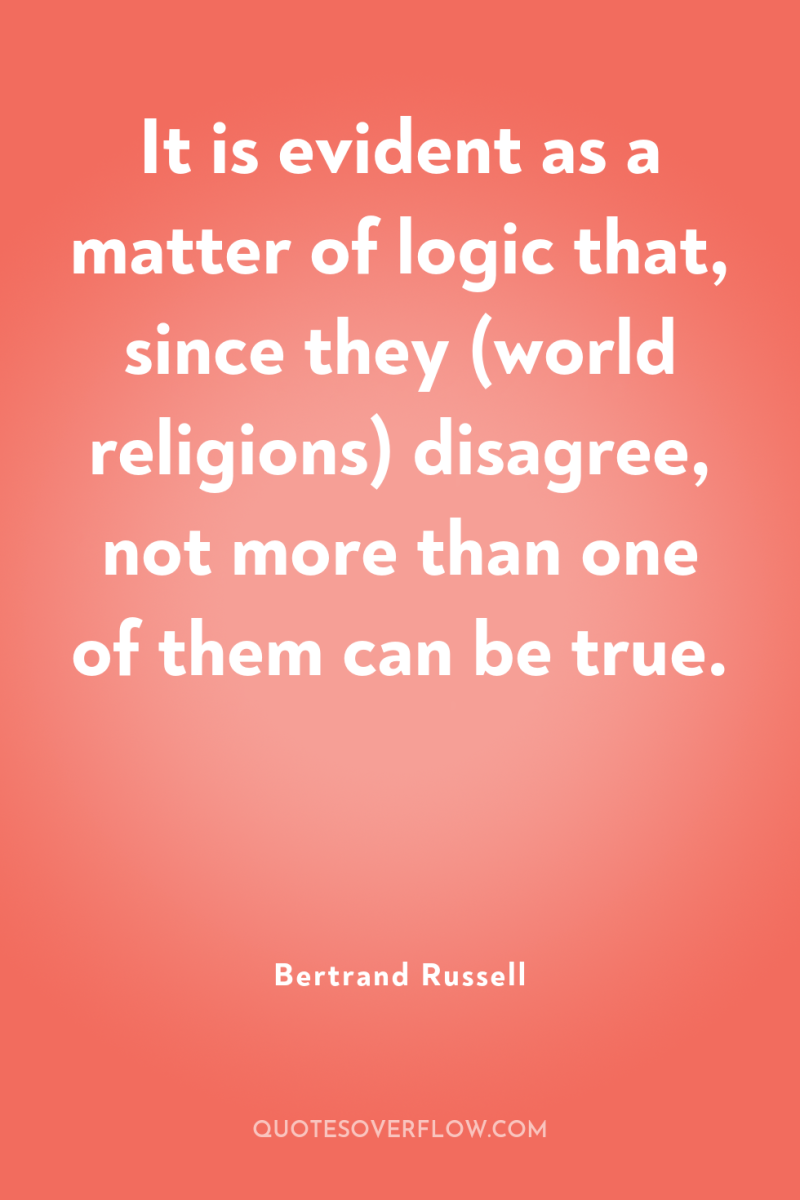
35
It is evident as a matter of logic that, since they (world religions) disagree, not more than one of them can be true.Bertrand Russell
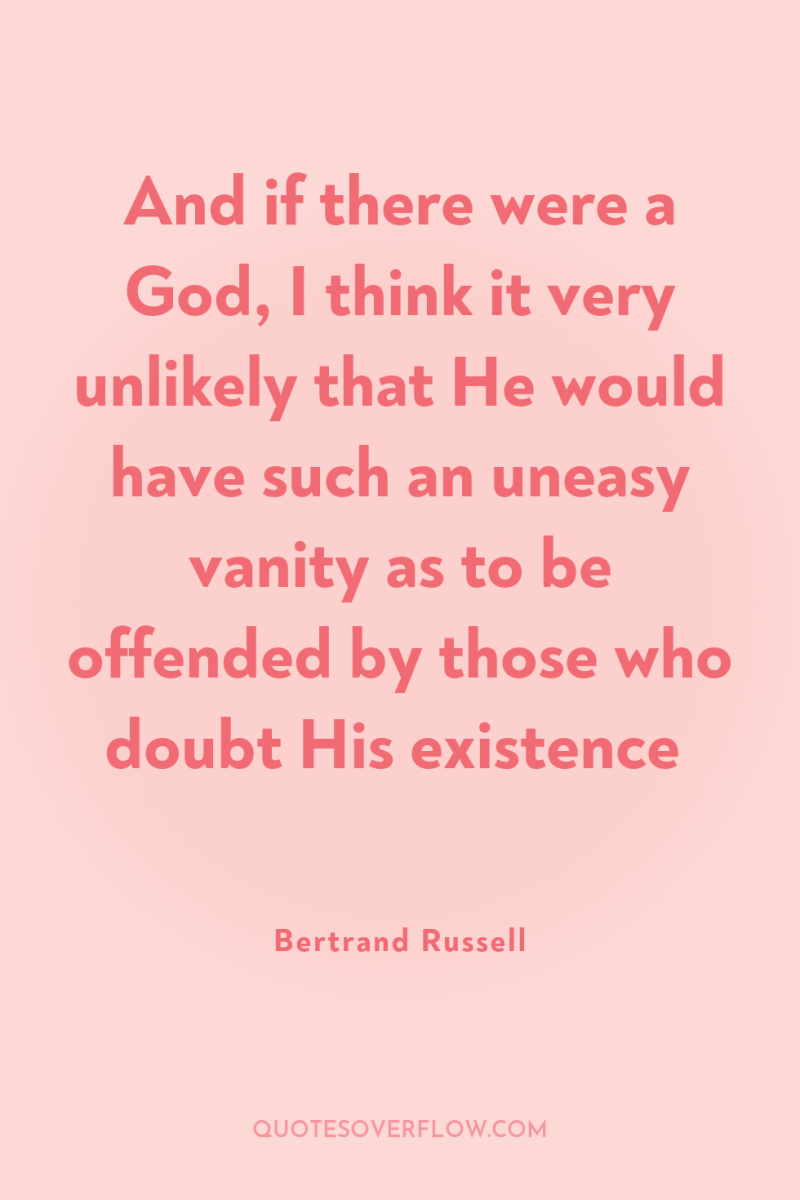
36
And if there were a God, I think it very unlikely that He would have such an uneasy vanity as to be offended by those who doubt His existenceBertrand Russell
37
Science can teach us, and I think our hearts can teach us, no longer to look around for imaginary supporters, no longer to invent allies in the sky, but rather to look to our own efforts here below to make the world a fit place to live.Bertrand Russell
38
You all know the argument from design: everything in the world is made just so that we can manage to live in the world, and if the world was ever so little different, we could not manage to live in it. That is the argument from design. It sometimes takes a rather curious form; for instance, it is argued that rabbits have white tails in order to be easy to shoot. I do not know how rabbits would view that application. .Bertrand Russell

39
In this lies Man's true freedom: in determination to worship only the God created by our own love of the good.Bertrand Russell
40
Love is wise; hatred is foolish. In this world, which is getting more and more closely interconnected, we have to learn to tolerate each other, we have to learn to put up with the fact that some people say things that we don't like. We can only live together in that way. But if we are to live together, and not die together, we must learn a kind of charity and a kind of tolerance, which is absolutely vital to the continuation of human life on this planet. .Bertrand Russell
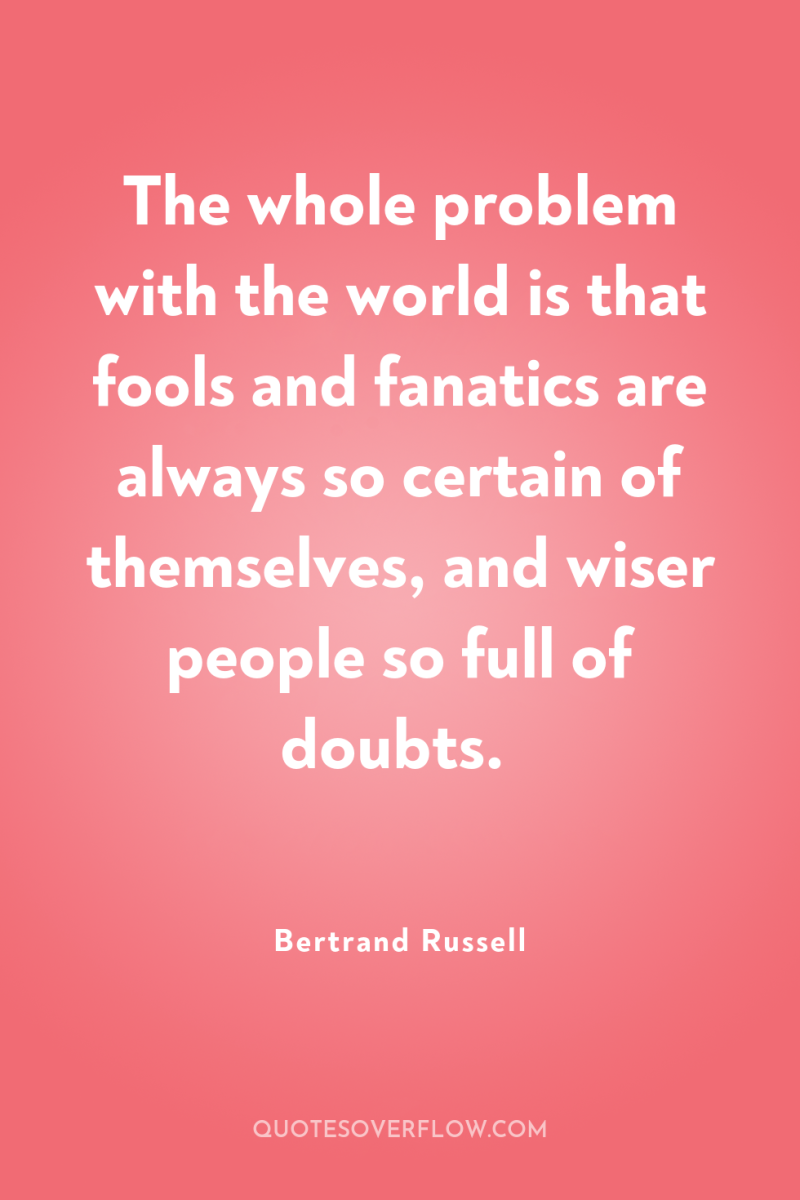
41
The whole problem with the world is that fools and fanatics are always so certain of themselves, and wiser people so full of doubts.Bertrand Russell
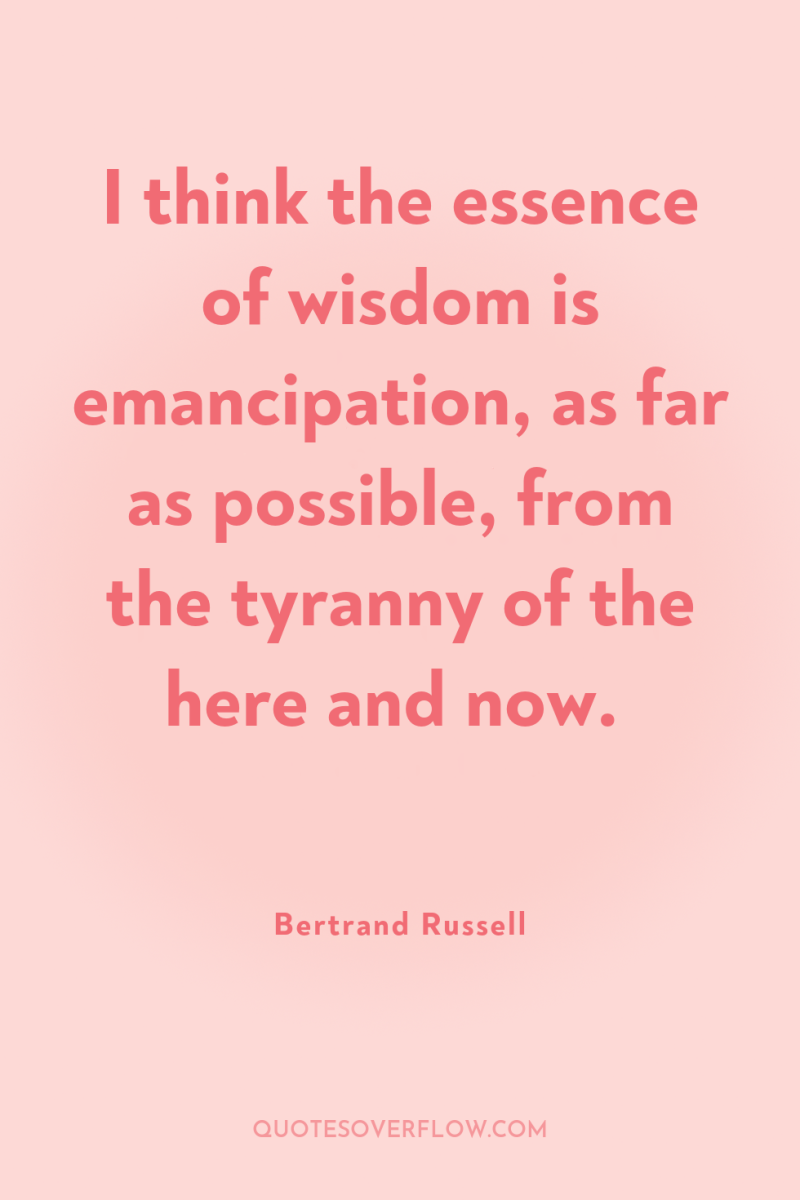
42
I think the essence of wisdom is emancipation, as far as possible, from the tyranny of the here and now.Bertrand Russell

43
When a man tells you he knows the exact truth about anything, you are safe in inferring he is an inexact man.Bertrand Russell
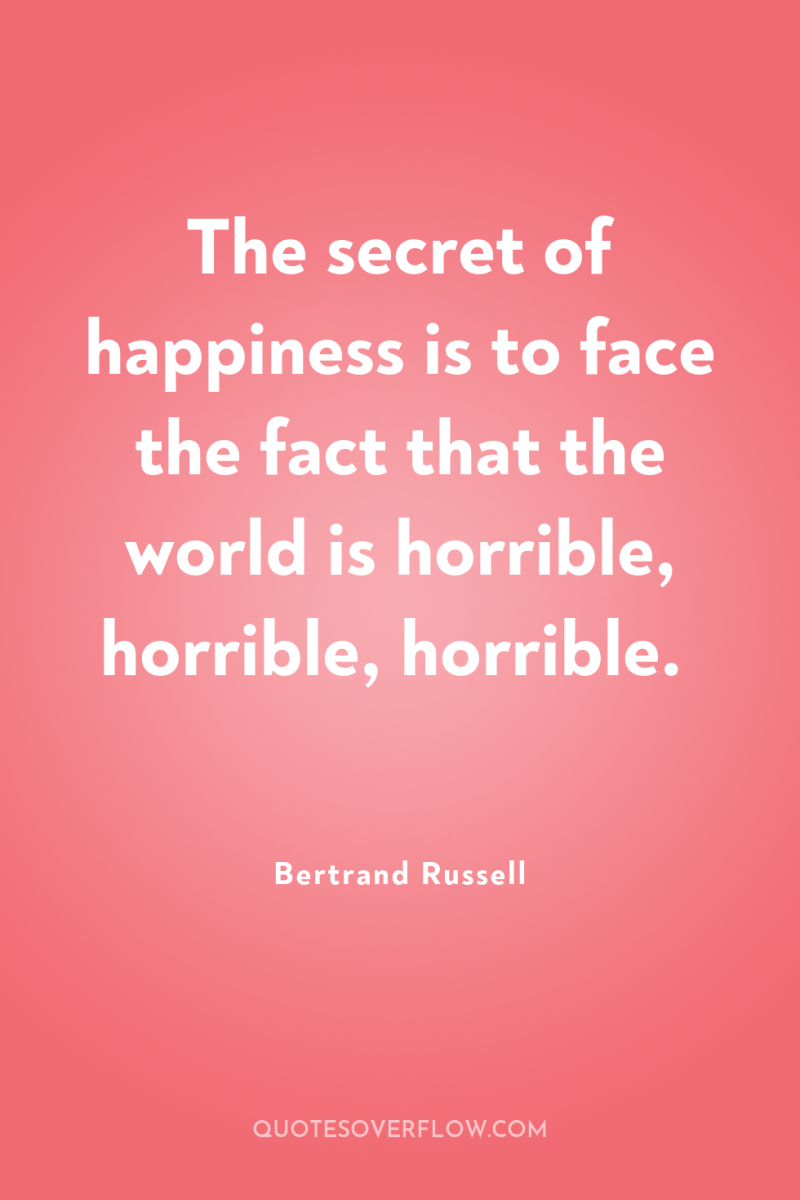
44
The secret of happiness is to face the fact that the world is horrible, horrible, horrible.Bertrand Russell
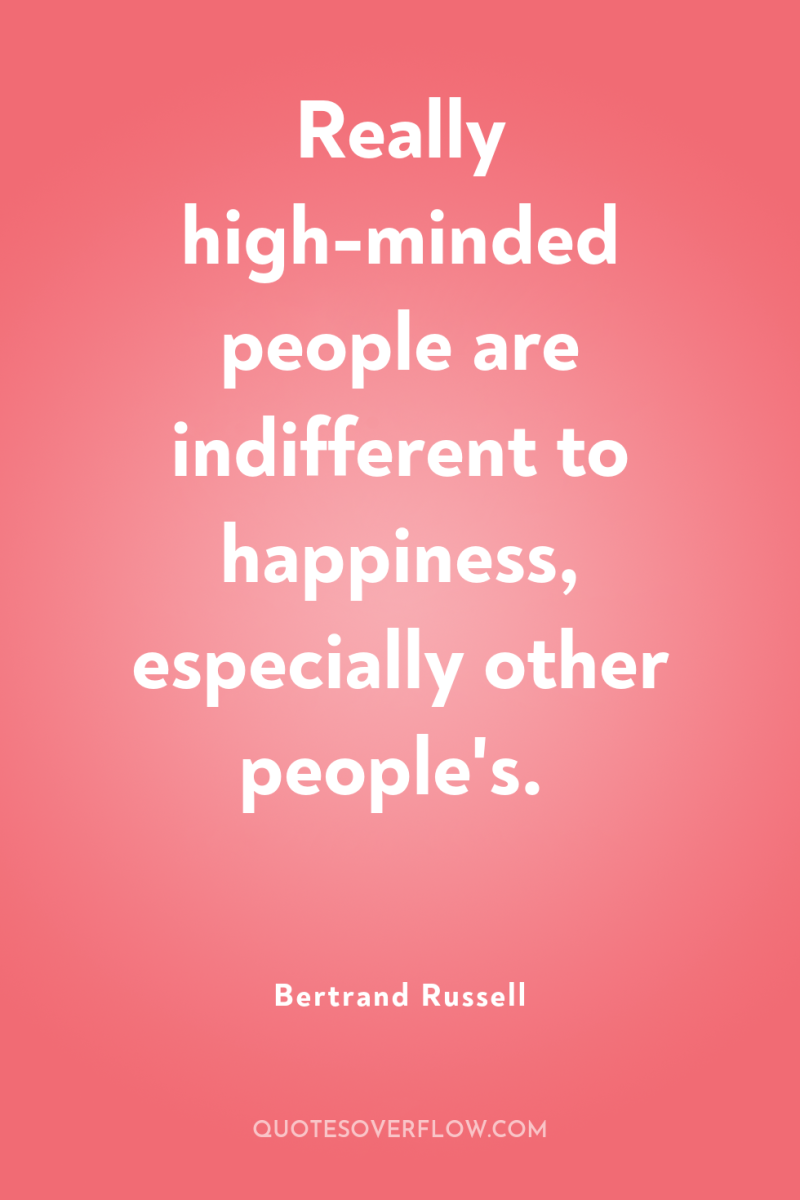
45
Really high-minded people are indifferent to happiness, especially other people's.Bertrand Russell
46
It is essential to happiness that our way of living should spring from our own deep impulses and not from the accidental tastes and desires of those who happen to be our neighbors, or even our relations.Bertrand Russell
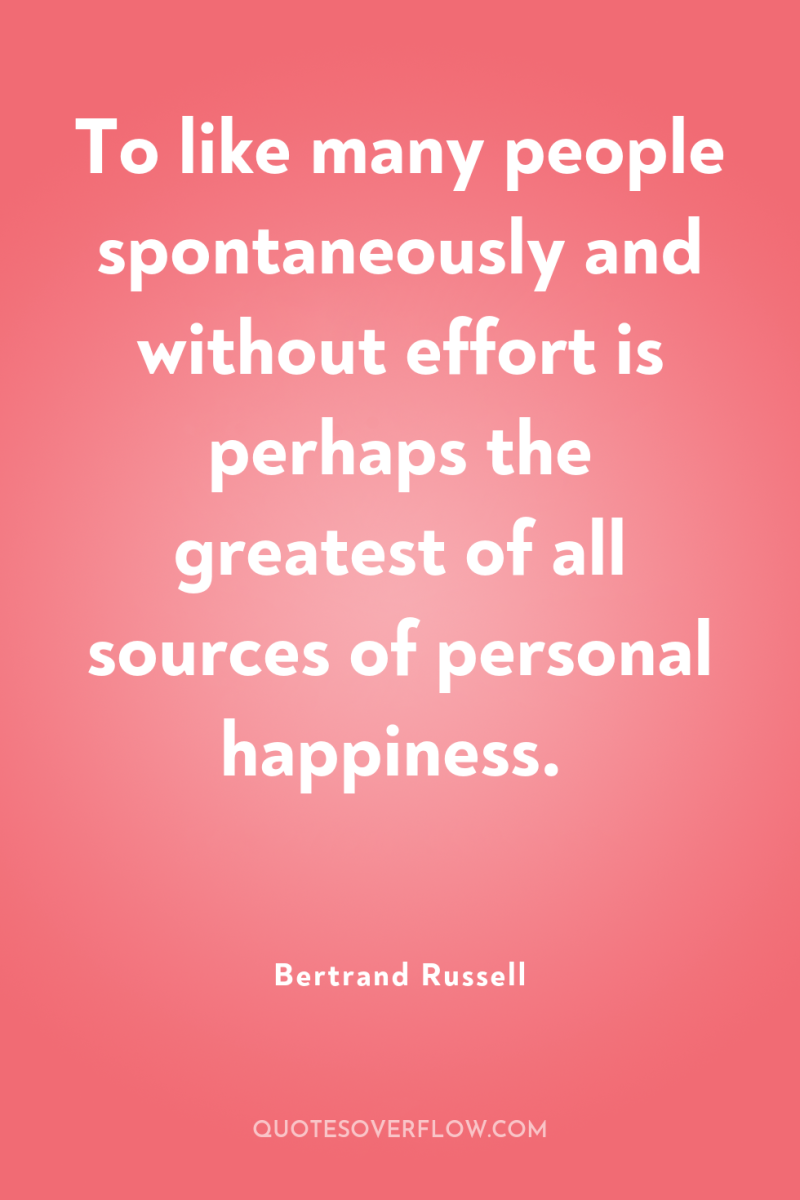
47
To like many people spontaneously and without effort is perhaps the greatest of all sources of personal happiness.Bertrand Russell
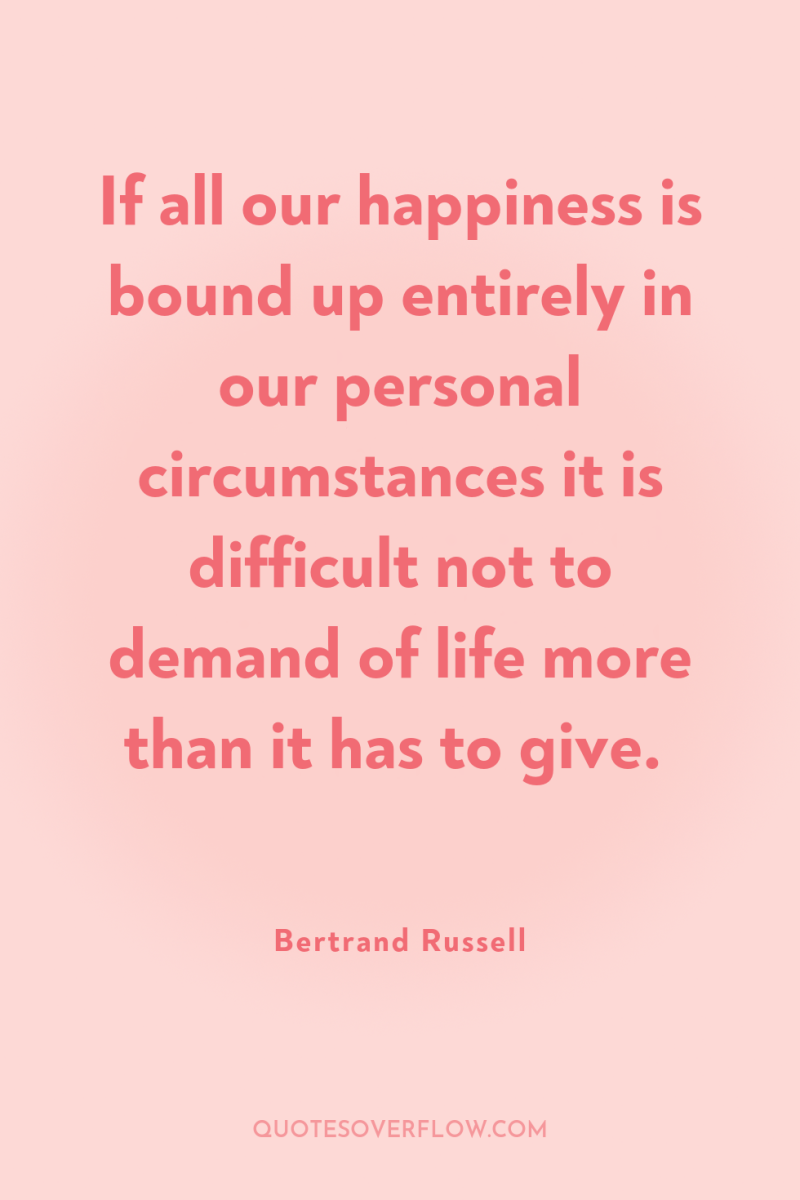
48
If all our happiness is bound up entirely in our personal circumstances it is difficult not to demand of life more than it has to give.Bertrand Russell
49
Yo no nacà dichoso. De niño, mi himno favorito era: «Cansado del mundo y con el peso de mis pecados». A los cinco años yo pensaba que si habÃa de vivir setenta no habÃa pasado aún más que la catorceava parte de mi vida vital, y me parecÃa casi insoportable la enorme cantidad de aburrimiento que me aguardaba. En la adolescencia la vida me era odiosa, y estaba continuamente al borde del suicidio, del cual me libré gracias al deseo de saber más matemáticas. Hoy, por el contrario, gusto de la vida, y casi estoy por decir que cada año que pasa la encuentro más gustosa. Esto es debido, en parte, a haber descubierto cuáles eran las cosas que deseaba más y haber adquirido gradualmente muchas de ellas. En parte es debido también a haberme desprendido, felizmente, de ciertos deseos (la adquisición del conocimiento indudable acerca de algo) como esencialmente inasequibles. Pero en la mayor parte se debe a la preocupación, cada dÃa menor, de mà mismo.Bertrand Russell
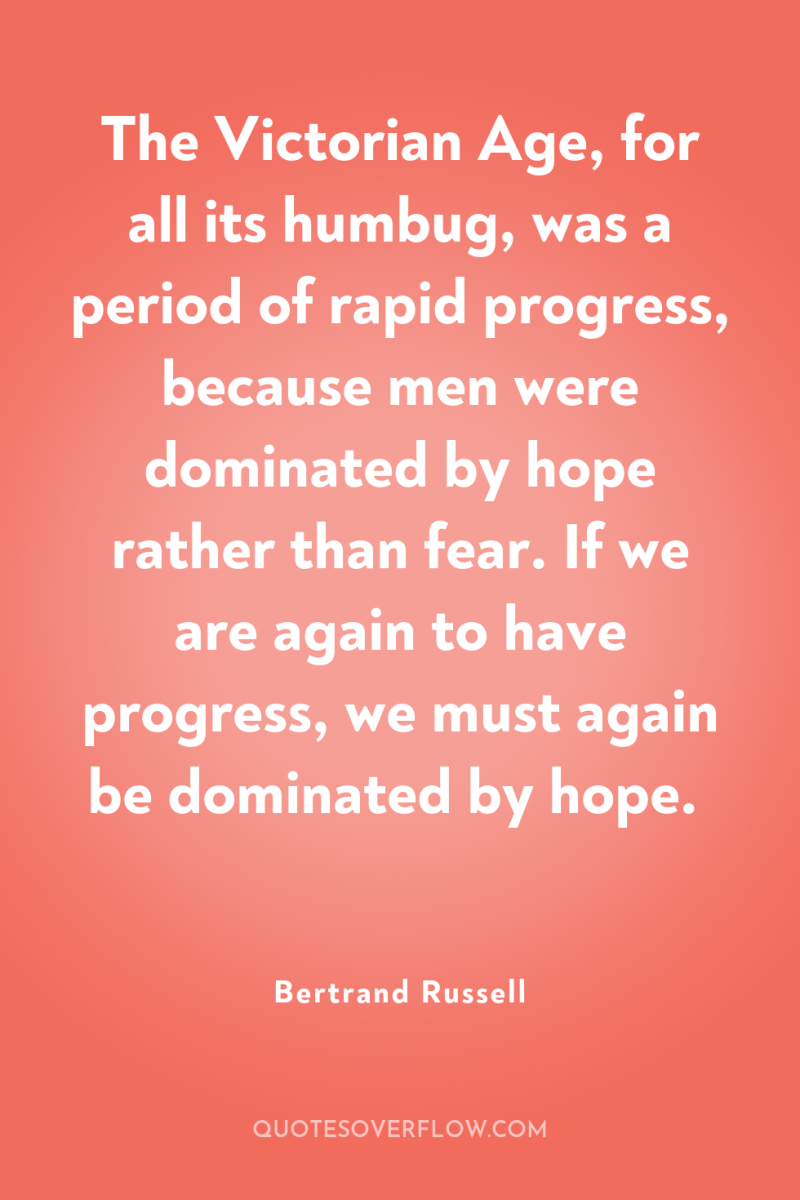
50
The Victorian Age, for all its humbug, was a period of rapid progress, because men were dominated by hope rather than fear. If we are again to have progress, we must again be dominated by hope.Bertrand Russell
51
The life of Man is a long march through the night, surrounded by invisible foes, tortured by weariness and pain, towards a goal that few can hope to reach, and where none may tarry long. One by one, as they march, our comrades vanish form our sight, seized by the silent orders of omnipotent Death. Very brief is the time in which we can help them, in which their happiness or misery is decided. Be it ours to shed sunshine on their path, to lighten their sorrows by the balm of sympathy, to give them the pure joy of a never-tiring affection, to strengthen failing courage, to instill faith in times of despair. .Bertrand Russell
52
I do not pretend to be able to prove that there is no God. I equally cannot prove that Satan is a fiction. The Christian god may exist; so may the gods of Olympus, or of ancient Egypt, or of Babylon. But no one of these hypotheses is more probable than any other: they lie outside the region of even probable knowledge, and therefore there is no reason to consider any of them.Bertrand Russell
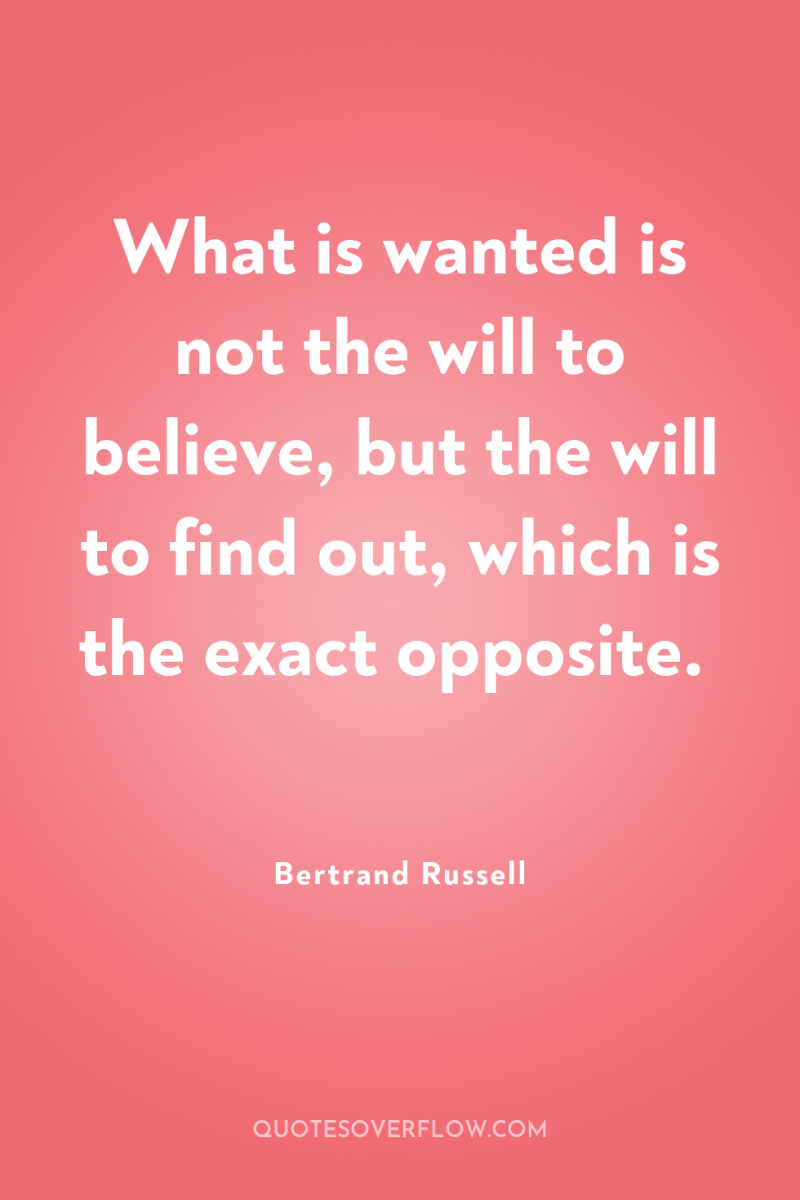
53
What is wanted is not the will to believe, but the will to find out, which is the exact opposite.Bertrand Russell

54
Neither love without knowledge nor knowledge without love can produce a good life.Bertrand Russell
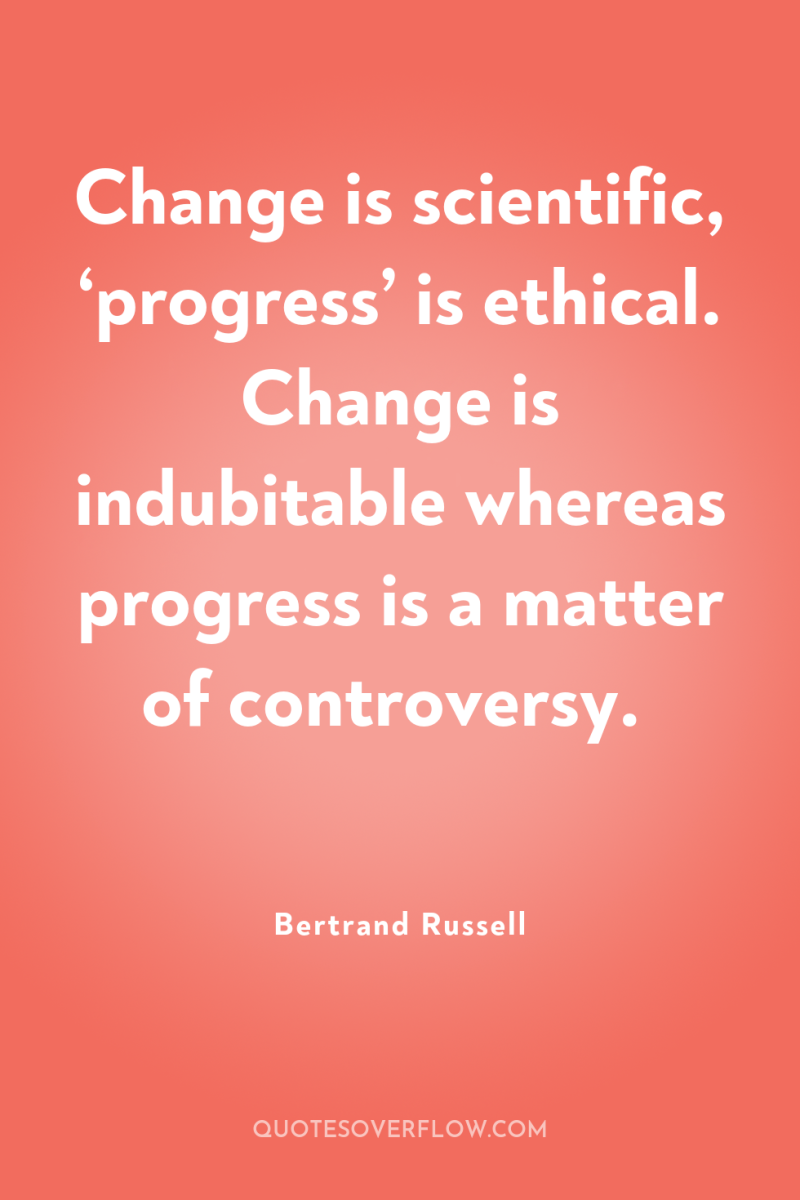
55
Change is scientific, ‘progress’ is ethical. Change is indubitable whereas progress is a matter of controversy.Bertrand Russell
56
Our great democracies still tend to think that a stupid man is more likely to be honest than a clever man, and our politicians take advantage of this prejudice by pretending to be even more stupid than nature made them.Bertrand Russell
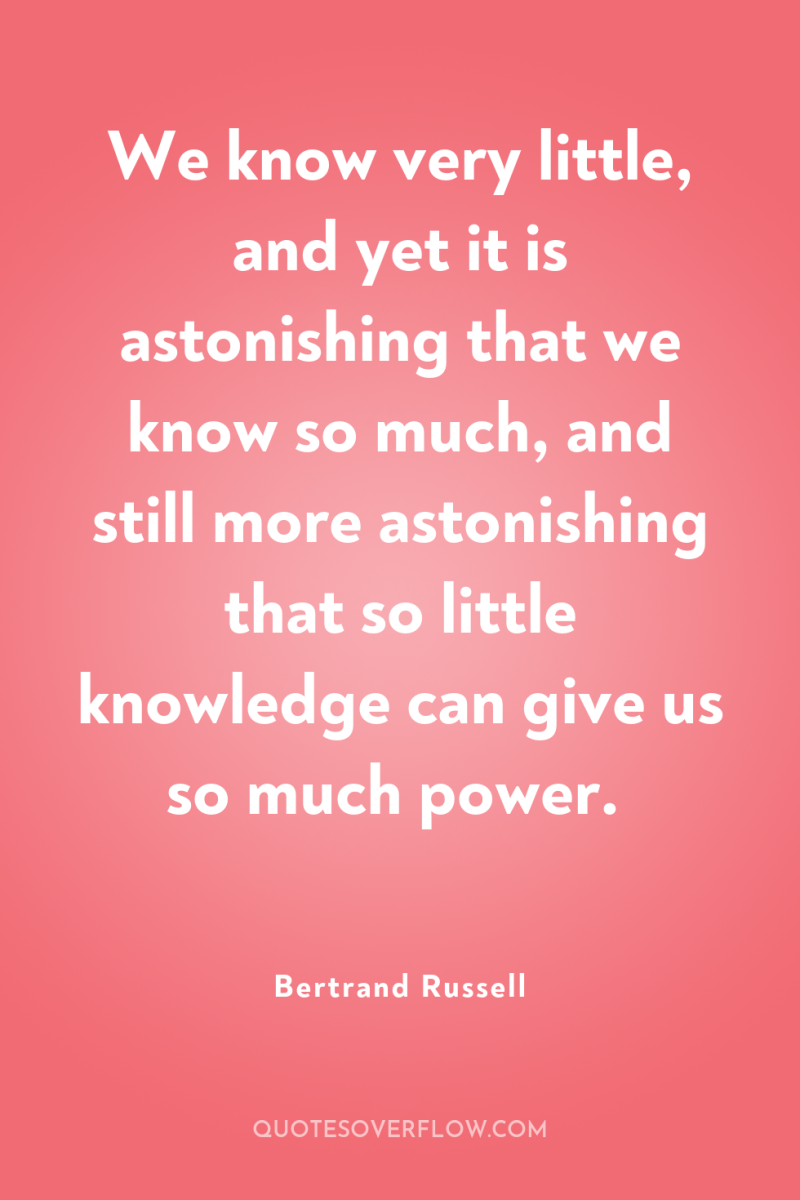
57
We know very little, and yet it is astonishing that we know so much, and still more astonishing that so little knowledge can give us so much power.Bertrand Russell
58
Even if the open windows of science at first make us shiver after the cozy indoor warmth of traditional humanizing myths, in the end the fresh air brings vigor, and the great spaces have a splendor of their own.Bertrand Russell
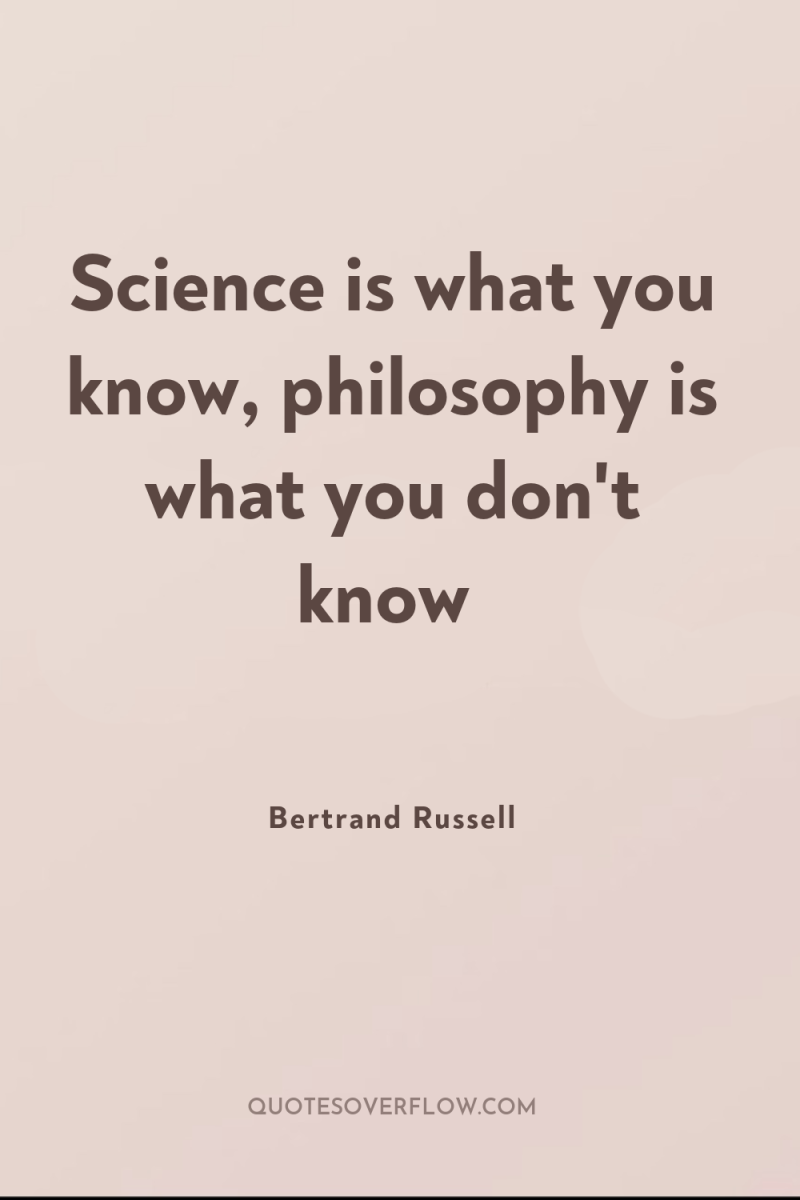
59
Science is what you know, philosophy is what you don't knowBertrand Russell
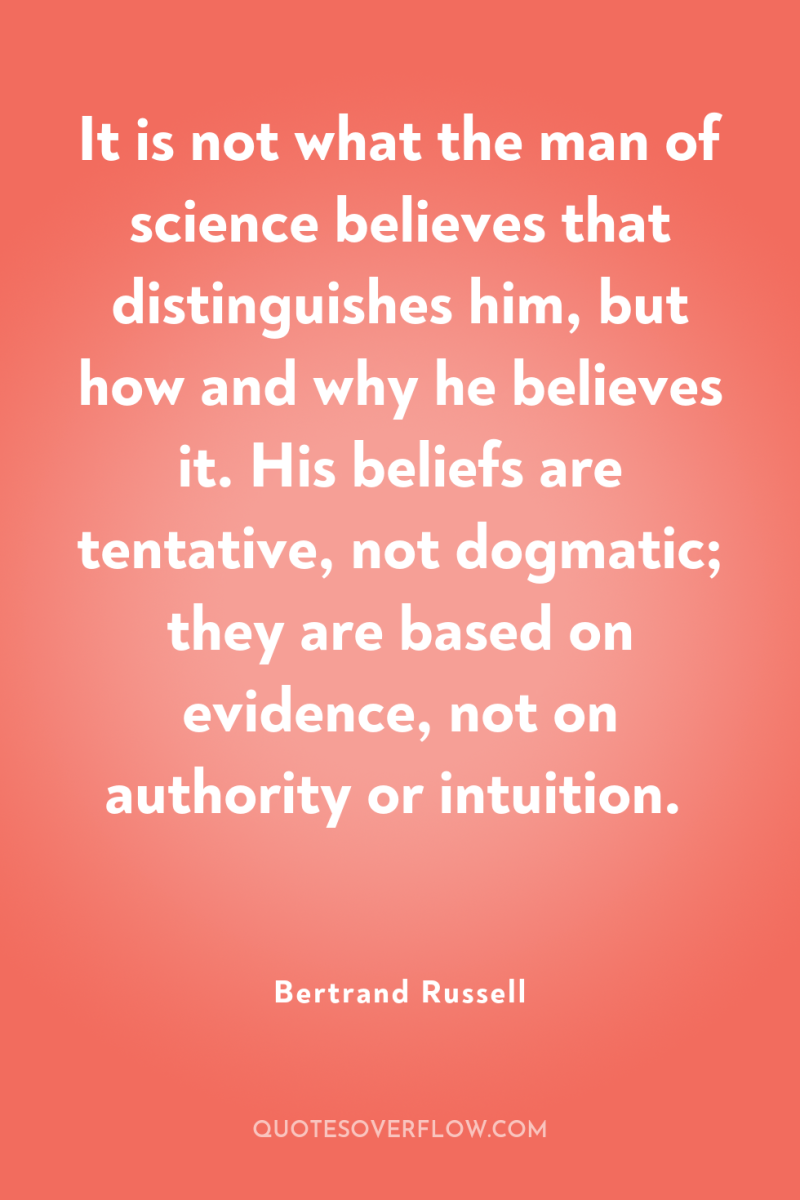
60
It is not what the man of science believes that distinguishes him, but how and why he believes it. His beliefs are tentative, not dogmatic; they are based on evidence, not on authority or intuition.Bertrand Russell

61
Aristotle maintained that women have fewer teeth than men; although he was twice married, it never occurred to him to verify this statement by examining his wives' mouths.Bertrand Russell
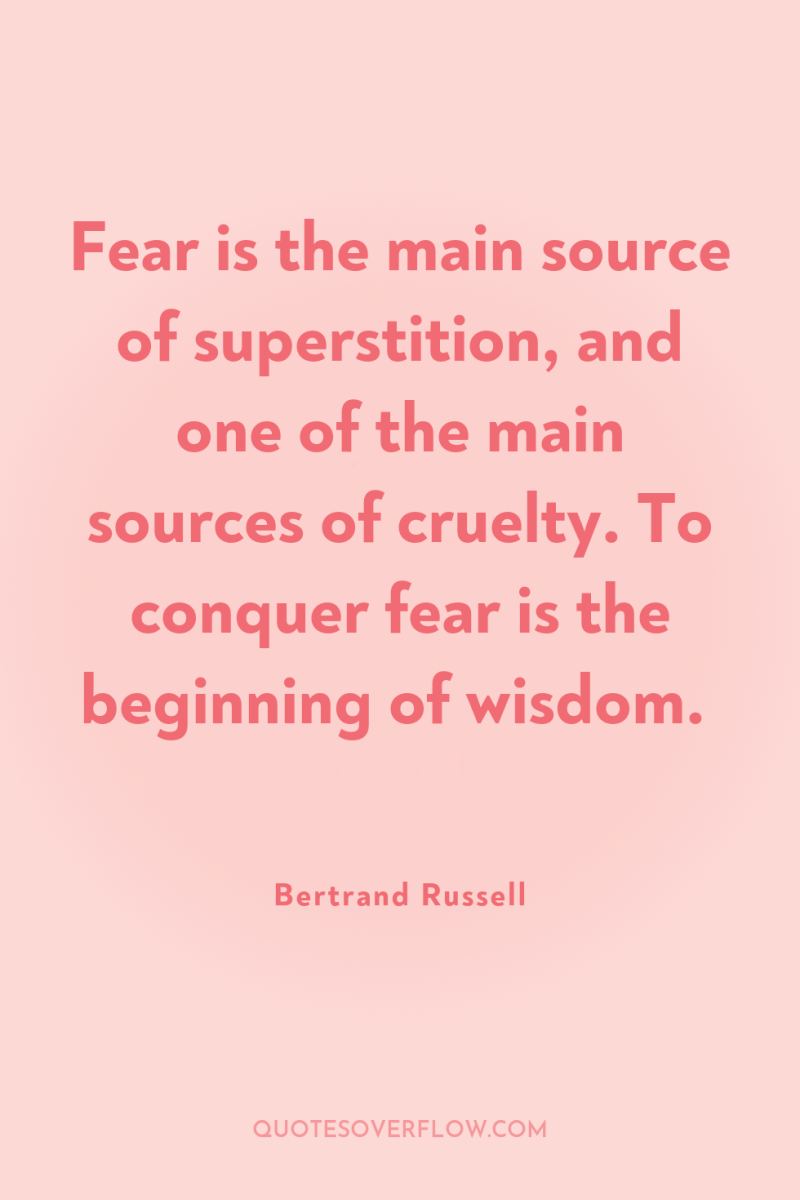
62
Fear is the main source of superstition, and one of the main sources of cruelty. To conquer fear is the beginning of wisdom.Bertrand Russell
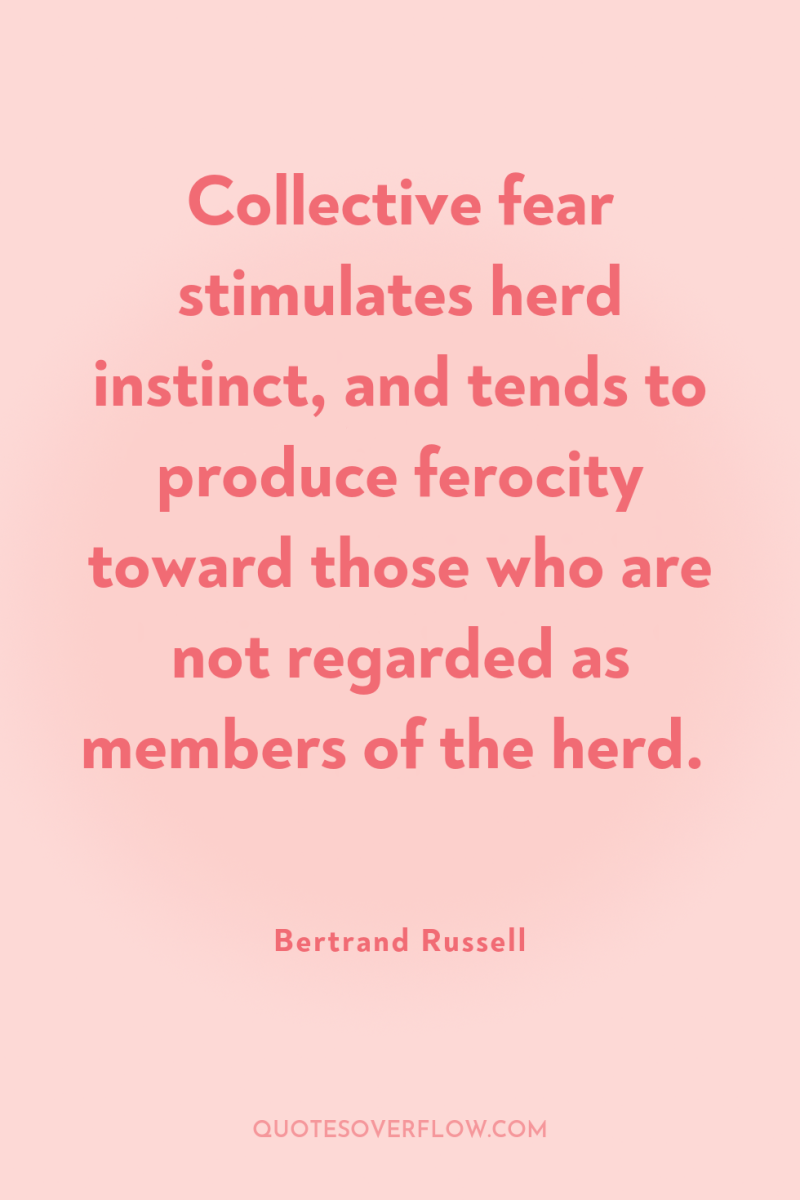
63
Collective fear stimulates herd instinct, and tends to produce ferocity toward those who are not regarded as members of the herd.Bertrand Russell
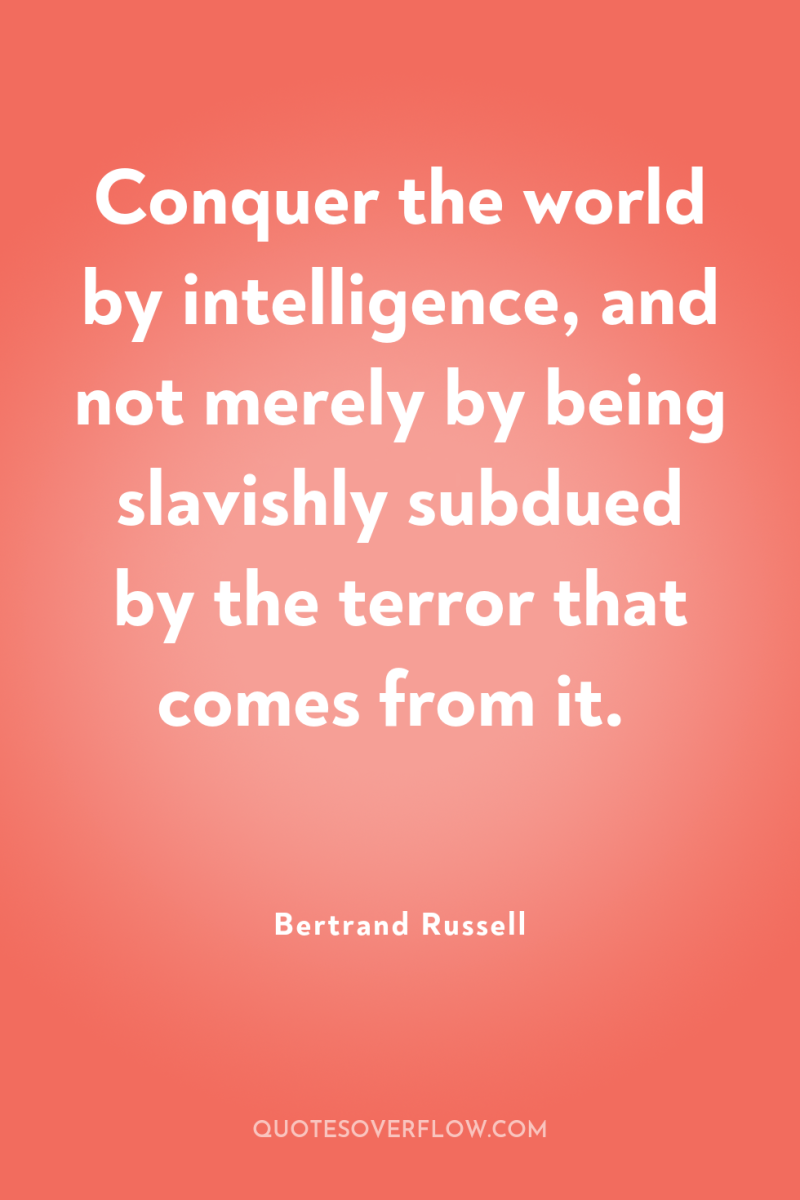
64
Conquer the world by intelligence, and not merely by being slavishly subdued by the terror that comes from it.Bertrand Russell
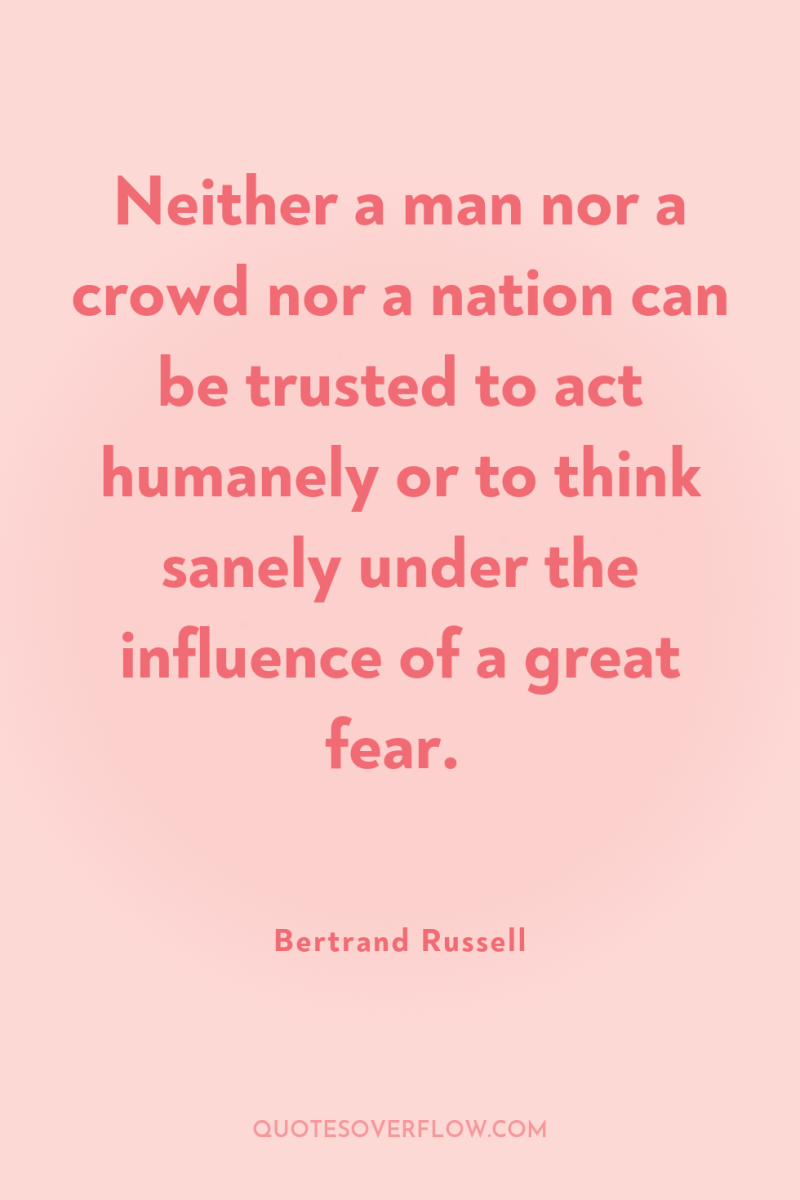
65
Neither a man nor a crowd nor a nation can be trusted to act humanely or to think sanely under the influence of a great fear.Bertrand Russell
66
Love is something far more than desire for sexual intercourse; it is the principal means of escape from the loneliness which afflicts most men and women throughout the greater part of their lives. There is a deep-seated fear, in most people, of the cold world and the possible cruelty of the herd; there is a longing for affection, which is often concealed by roughness, boorishness or a bullying manner in men, and by nagging and scolding in women. Passionate mutual love while it lasts puts an end to this feeling; it breaks down the hard walls of the ego, producing a new being composed of two in one.Bertrand Russell
67
If we were all given by magic the power to read each other’s thoughts, I suppose the first effect would be almost all friendships would be dissolved; the second effect, however, might be excellent, for a world without any friends would be felt to be intolerable, and we should learn to like each other without needing a veil of illusion to conceal from ourselves that we did not think each other absolutely perfect.Bertrand Russell
68
In the outworks of our lives, we were almost strangers, but we shared a certain outlook on human life and human destiny, which, from the very first, made a bond of extreme strength . At our very first meeting, we talked with continually increasing intimacy. We seemed to sink through layer after layer of what was superficial, till gradually both reached the central fire. It was an experience unlike any other that I have known. We looked into each other's eyes, half appalled and half intoxicated to find ourselves together in such a region. The emotion was as intense as passionate love, and at the same time all-embracing. I came away bewildered, and hardly able to find my way among ordinary affairs.Bertrand Russell
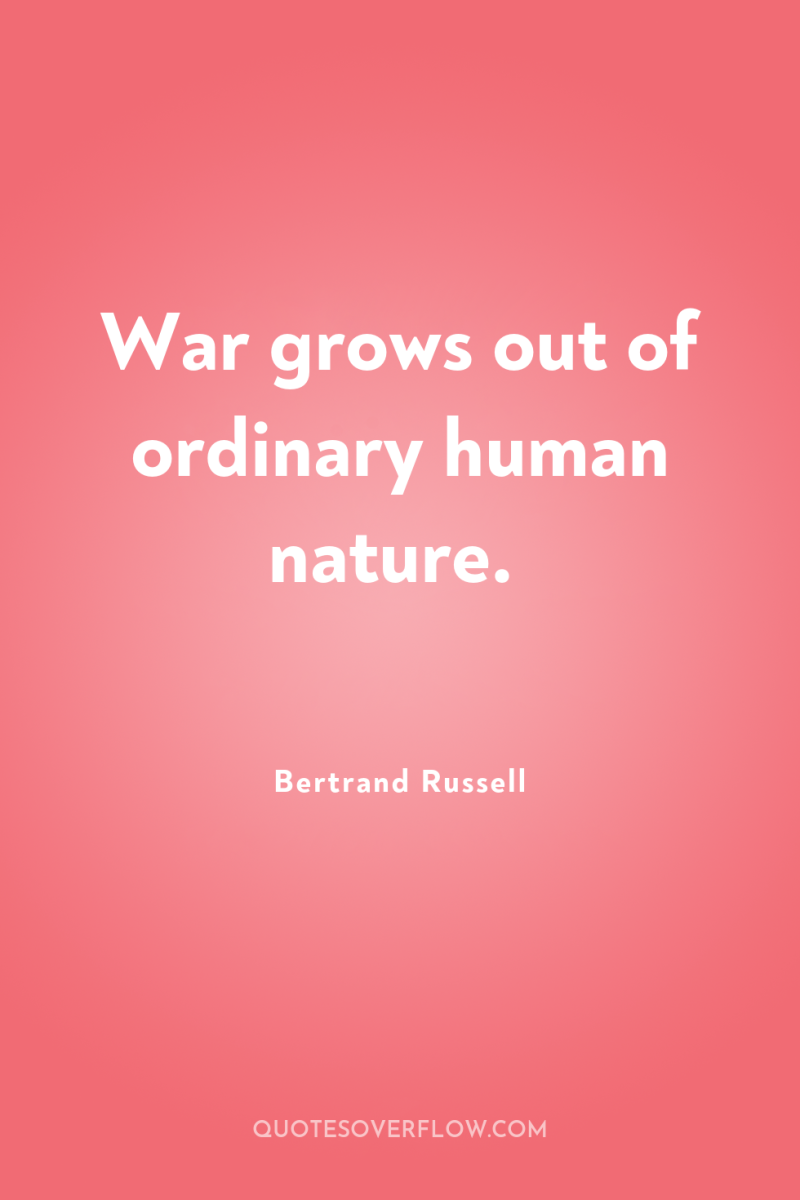
69
War grows out of ordinary human nature.Bertrand Russell
70
I hate the world and almost all the people in it. I hate the Labour Congress and the journalists who send men to be slaughtered, and the fathers who feel a smug pride when their sons are killed, and even the pacifists who keep saying human nature is essentially good, in spite of all the daily proofs to the contrary. I hate the planet and the human race– I am ashamed to belong to such a species.Bertrand Russell
71
In the Second World War he took no public part, having escaped to a neutral country just before its outbreak. In private conversation he was wont to say that homicidal lunatics were well employed in killing each other, but that sensible men would keep out of their way while they were doing it. Fortunately this outlook, which is reminiscent of Bentham, has become rare in this age, which recognizes that heroism has a value independent of its utility. The Last Survivor of a Dead Epoch.Bertrand Russell
72
Men fear thought as they fear nothing else on earth -- more than ruin, more even than death. Thought is subversive and revolutionary, destructive and terrible, thought is merciless to privilege, established institutions, and comfortable habits; thought is anarchic and lawless, indifferent to authority, careless of the well-tried wisdom of the ages. Thought looks into the pit of hell and is not afraid .. Thought is great and swift and free, the light of the world, and the chief glory of man. .Bertrand Russell
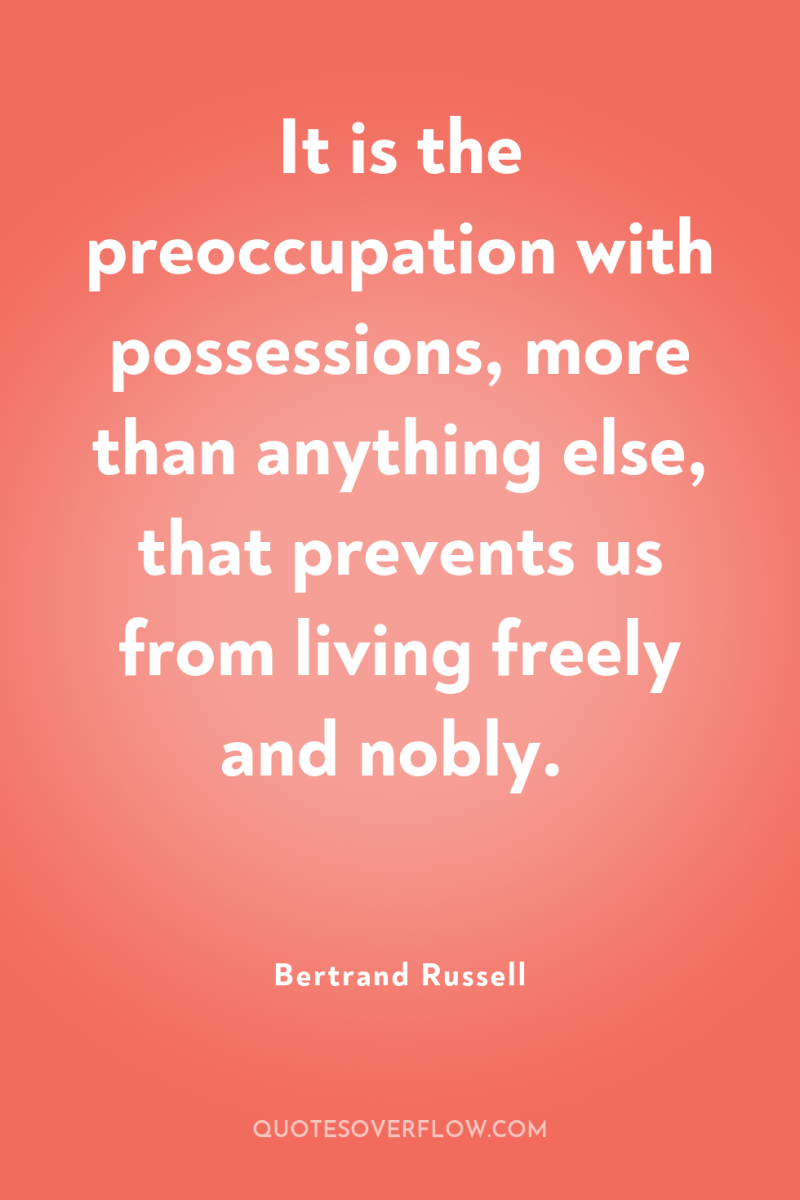
73
It is the preoccupation with possessions, more than anything else, that prevents us from living freely and nobly.Bertrand Russell
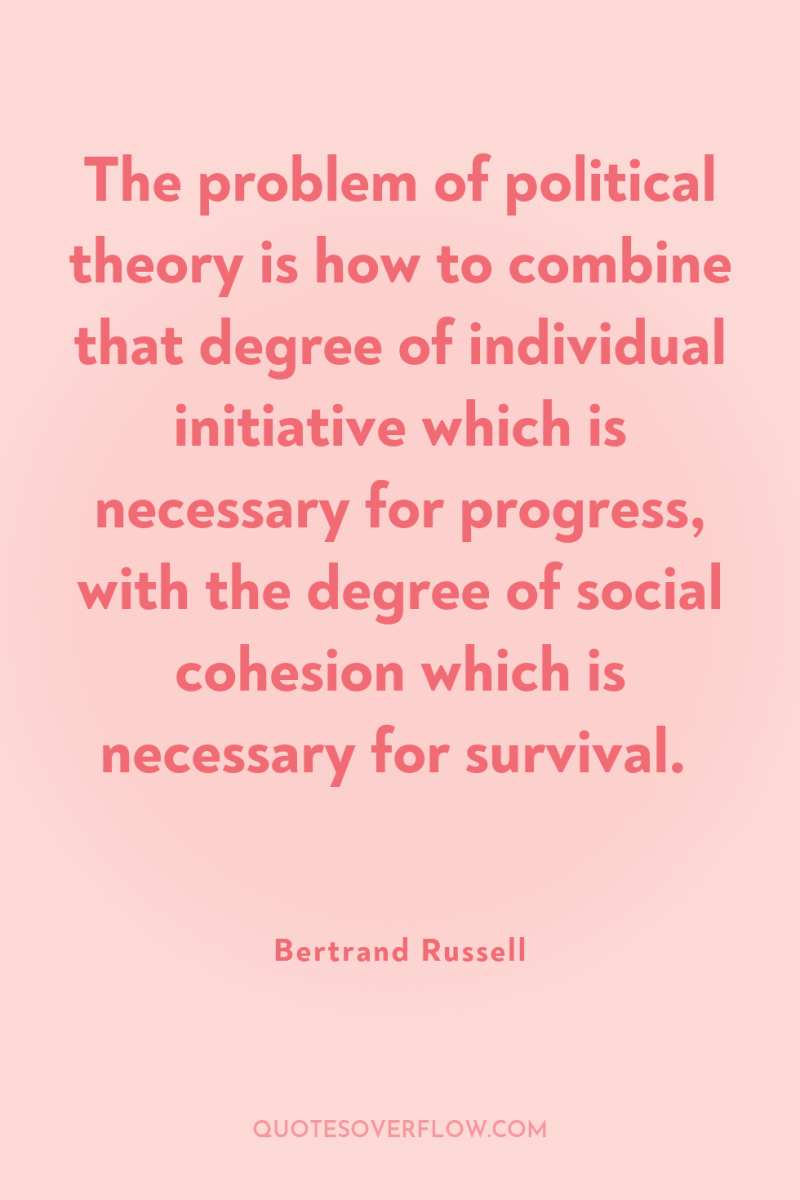
74
The problem of political theory is how to combine that degree of individual initiative which is necessary for progress, with the degree of social cohesion which is necessary for survival.Bertrand Russell
75
The psychology of adultery has been falsified by conventional morals, which assume, in monogamous countries, that attraction to one person cannot coexist with affection for another. Everybody knows that this is untrue.Bertrand Russell
76
If I were to suggest that between the Earth and Mars there is a china teapot revolving about the sun in an elliptical orbit, nobody would be able to disprove my assertion provided I were careful to add that the teapot is too small to be revealed even by our most powerful telescopes. But if I were to go on to say that, since my assertion cannot be disproved, it is an intolerable presumption on the part of human reason to doubt it, I should rightly be thought to be talking nonsense. If, however, the existence of such a teapot were affirmed in ancient books, taught as the sacred truth every Sunday, and instilled into the minds of children at school, hesitation to believe in its existence would become a mark of eccentricity and entitle the doubter to the attentions of the psychiatrist in an enlightened age or of the Inquisitor in an earlier time.Bertrand Russell
77
It is true that the modern Christian is less robust, but that is not thanks to Christianity; it is thanks to the generations of freethinkers, who from the Renaissance to the present day, have made Christians ashamed of many of their traditional beliefs. It is amusing to hear the modern Christian telling you how mild and rationalistic Christianity really is and ignoring the fact that all its mildness and rationalism is due to the teaching of men who in their own day were persecuted by all orthodox Christians.Bertrand Russell
78
When the qualities that now confer leadership have become universal, there will no longer be leaders and followers, and democracy will have been realized at last.Bertrand Russell
79
A stupid man's report of what a clever man says can never be accurate, because he unconsciously translates what he hears into something he can understand.Bertrand Russell
80
One of the symptoms of an approaching nervous breakdown is the belief that one’s work is terribly important.Bertrand Russell
81
I want to say, in all seriousness, that a great deal of harm is being done in the modern world by belief in the virtuousness of work, and that the road to happiness and prosperity lies in an organised diminution of work.Bertrand Russell
82
In the modern world, however, love has another enemy more dangerous than religion, and that is the gospel of work and economic success. It is generally held, especially in America, that a man should not allow love to interfere with his career, and that if he does, he is silly. But in this as in all human matters a balance is necessary.Bertrand Russell
83
That is the idea -- that we should all be wicked if we did not hold to the Christian religion. It seems to me that the people who have held to it have been for the most part extremely wicked. You find this curious fact, that the more intense has been the religion of any period and the more profound has been the dogmatic belief, the greater has been the cruelty and the worse has been the state of affairs. In the so-called ages of faith, when men really did believe the Christian religion in all its completeness, there was the Inquisition, with all its tortures; there were millions of unfortunate women burned as witches; and there was every kind of cruelty practiced upon all sorts of people in the name of religion. You find as you look around the world that every single bit of progress in humane feeling, every improvement in the criminal law, every step toward the diminution of war, every step toward better treatment of the colored races, or every mitigation of slavery, every moral progress that there has been in the world, has been consistently opposed by the organized churches of the world. I say quite deliberately that the Christian religion, as organized in its churches, has been and still is the principal enemy of moral progress in the world. You may think that I am going too far when I say that that is still so. I do not think that I am. Take one fact. You will bear with me if I mention it. It is not a pleasant fact, but the churches compel one to mention facts that are not pleasant. Supposing that in this world that we live in today an inexperienced girl is married to a syphilitic man; in that case the Catholic Church says, 'This is an indissoluble sacrament. You must endure celibacy or stay together. And if you stay together, you must not use birth control to prevent the birth of syphilitic children.' Nobody whose natural sympathies have not been warped by dogma, or whose moral nature was not absolutely dead to all sense of suffering, could maintain that it is right and proper that that state of things should continue. That is only an example. There are a great many ways in which, at the present moment, the church, by its insistence upon what it chooses to call morality, inflicts upon all sorts of people undeserved and unnecessary suffering. And of course, as we know, it is in its major part an opponent still of progress and improvement in all the ways that diminish suffering in the world, because it has chosen to label as morality a certain narrow set of rules of conduct which have nothing to do with human happiness; and when you say that this or that ought to be done because it would make for human happiness, they think that has nothing to do with the matter at all. 'What has human happiness to do with morals? The object of morals is not to make people happy.Bertrand Russell
84
When a child reaches adolescence, there is very apt to be a conflict between parents and child, since the latter considers himself to be by now quite capable of managing his own affairs, while the former are filled with parental solicitude, which is often a disguise for love of power. Parents consider, usually, that the various moral problems which arise in adolescence are peculiarly their province. The opinions they express, however, are so dogmatic that the young seldom confide in them, and usually go their own way in secret.Bertrand Russell
85
It is not difficult for an unwise mother quite unintentionally to centre the heterosexual feelings of a young son upon herself, and it is true that, if this is done, the evil consequences pointed out by Freud will probably ensue. This is, however, much less likely to occur if the mother's sexual life is satisfying to her, for in that case she will not look to her child for a type of emotional satisfaction which ought to be sought only from adults. The parental impulse in its purity is an impulse to care for the young, not to demand affection from them, and if a woman is happy in her sexual life she will abstain spontaneously from all improper demands for emotional response from her child.Bertrand Russell
86
Perhaps the greatest importance of the family, in these days of contraceptives, is that it preserves the habit of having children.Bertrand Russell
87
Travelling, whether in the mental or the physical world, is a joy, and it is good to know that, in the mental world at least, there are vast countries still very imperfectly exploredBertrand Russell
88
For the young, there is nothing unattainable; a good thing desired with the whole force of a passionate will, and yet impossible, is to them not credible. Yet, by death, by illness, by poverty, or by the voice of duty, we must learn, each one of us, that the world was not made for us, and that, however beautiful may be the things we crave, Fate may nevertheless forbid them. It is the part of courage, when misfortune comes, to bear without regretting the ruin of our hopes, to turn away our thoughts from vain regrets. This degree of submission to power is not only just and right: it is the very gate of wisdom. .Bertrand Russell
89
The fundamental cause of the trouble is that in the modern world the stupid are cocksure while the intelligent are full of doubt.Bertrand Russell
90
In the visible world, the Milky Way is a tiny fragment; within this fragment, the solar system is an infinitesimal speck, and of this speck our planet is a microscopic dot. On this dot, tiny lumps of impure carbon and water, of complicated structure, with somewhat unusual physical and chemical properties, crawl about for a few years, until they are dissolved again into the elements of which they are compounded.Bertrand Russell
91
What I Have Lived ForThree passions, simple but overwhelmingly strong, have governed my life: the longing for love, the search for knowledge, and unbearable pity for the suffering of mankind. These passions, like great winds, have blown me hither and thither, in a wayward course, over a great ocean of anguish, reaching to the very verge of despair. I have sought love, first, because it brings ecstasy - ecstasy so great that I would often have sacrificed all the rest of life for a few hours of this joy. I have sought it, next, because it relieves loneliness--that terrible loneliness in which one shivering consciousness looks over the rim of the world into the cold unfathomable lifeless abyss. I have sought it finally, because in the union of love I have seen, in a mystic miniature, the prefiguring vision of the heaven that saints and poets have imagined. This is what I sought, and though it might seem too good for human life, this is what--at last-- I have found. With equal passion I have sought knowledge. I have wished to understand the hearts of men. I have wished to know why the stars shine. And I have tried to apprehend the Pythagorean power by which number holds sway above the flux. A little of this, but not much, I have achieved. Love and knowledge, so far as they were possible, led upward toward the heavens. But always pity brought me back to earth. Echoes of cries of pain reverberate in my heart. Children in famine, victims tortured by oppressors, helpless old people a burden to their sons, and the whole world of loneliness, poverty, and pain make a mockery of what human life should be. I long to alleviate this evil, but I cannot, and I too suffer. This has been my life. I have found it worth living, and would gladly live it again if the chance were offered me.Bertrand Russell
92
But without going to such extremes prudence may easily involve the loss of some of the best things in life. The worshipper of Dionysus reacts against prudence. In intoxication, physical or spiritual, he recovers an intensity of feeling which prudence had destroyed; he finds the world full of delight and beauty, and his imagination is suddenly liberated from the prison of every-day preoccupations.Bertrand Russell
93
But without going to such extremes prudence may easily involve the loss of some of the best things in life. The worshipper of Dionysus reacts against prudence. In intoxication, physical or spiritual, he recovers an intensity of feeling which prudence had destroyed; he finds the world full of delight and beauty, and his imagination is suddenly liberated from the prison of every-day preoccupationsBertrand Russell
94
Physics is mathematical not because we know so much about the physical world, but because we know so little; it is only its mathematical properties that we can discover.Bertrand Russell
95
If children learn of sex as a relation between their parents to which they owe their own existence, they learn of it in its best form and in connection with its biological purpose.Bertrand Russell
96
For the inexperienced, however, it is very difficult to distinguish passionate love from mere sex hunger; especially is this the case with well-brought-up girls, who have been taught that they could not possibly like to kiss a man unless they loved him.Bertrand Russell
97
When you want to teach children to think, you begin by treating them seriously when they are little, giving them responsibilities, talking to them candidly, providing privacy and solitude for them, and making them readers and thinkers of significant thoughts from the beginning. That’s if you want to teach them to think.Bertrand Russell
98
The affection of parents makes infants feel safe in this dangerous world, and gives them boldness in experimentation and in exploration of their environments.Bertrand Russell
99
The heterosexual emotions of young children can find a natural, wholesome and innocent outlet with other children; in this form they are a part of play, and like all play, they afford a preparation for adult activities.Bertrand Russell
100
Both men and women who have children as a rule regulate their lives largely with reference to them, and children cause perfectly ordinary men and women to act unselfishly in certain ways, of which perhaps life insurance is the most definite and measurable.Bertrand Russell